
|
#947 (5/8/23)

|
|
BY TONY FOURNIER |
|
Imperial artists included in Part Three of this article are Smiley Lewis, Slim Whitman, Fats Domino, Bobby Mitchell And The Toppers, Dave Bartholomew, The Love Notes, Rose Mitchell, Jesse Allen, Audrey Walker, , and Guitar Slim. |
LEWIS CHUDD — OWNER AND PRESIDENT OF IMPERIAL RECORDS
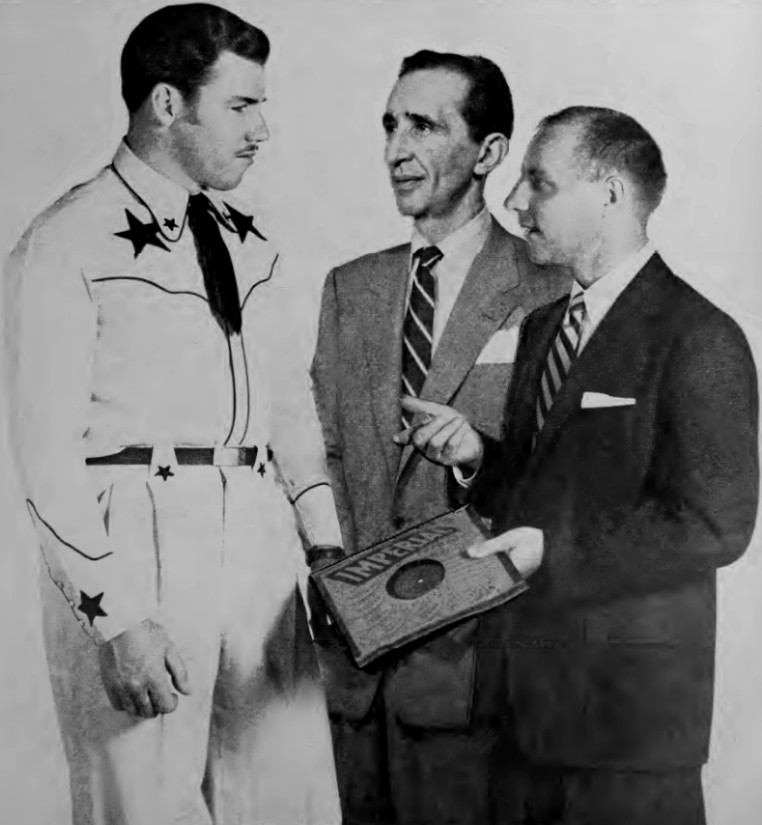
|
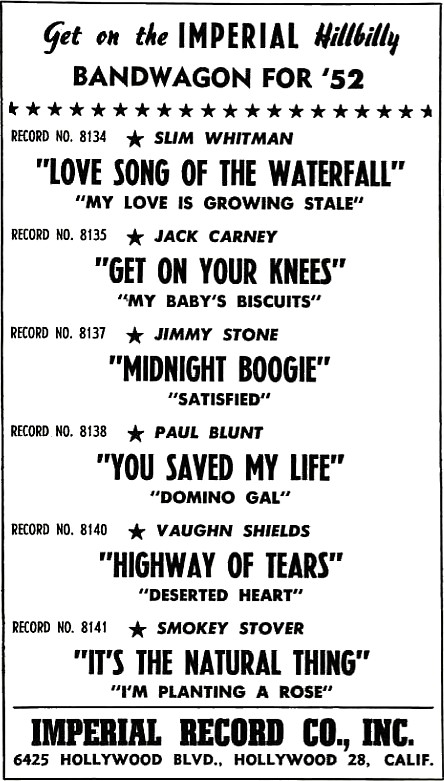
|
Above Left: CASH BOX COVER, February 7, 1953:
CAPTION: One of the great new stars in the folk field in recent months has been Slim Whitman, whose "Indian Love Call" on the Imperial label was a top hit not only in the folk but also in the pop field. Here Slim is shown with Lew Chudd (center), president of Imperial, and O. K. Makela (right), his manager. His latest release is "How Can I Tell" backed with "All That I Ask Is Sympathy".
Above Right: THE BILLBOARD, December 29, 1951.
THE IMPERIAL RECORDS STORY (PART FOUR)
(CASH BOX, October 5, 1957)....Less than a year after Chudd had first discovered Fats and had successfully launched him, he ventured a look at R&B music's kissin' cousin, hillbilly music. As in the case of the three types of music Imperial was already specializing in, hillbilly was virtually being ignored. So when he decided to invade the hillbilly field, he signed only one artist and concentrated solely on him.
His phenomenal eye for talent and material paid off again when the first record he cut, "Chew Tobacco Rag" by Billy Briggs, became a hit. "I have always maintained that the right material is as important and sometimes even more important than the artist," adds Chudd. "I don't mean to take anything away from Billy Briggs' fine singing, but the title, "Chew Tobacco Rag," sold itself.
I remember walking into a disk jockey's booth while he was on the air and handing him the record. He would laugh at the title, but he would immediately program it. This scene was repeated hundreds of times. The song was a great piece of material, not only because of the lyrics and music, but more importantly, because of the title. Anytime a song title can bring a smile to your face the battle is half won."
LISTEN (Windows Media Player): "Chew Tobacco Rag" - Billy Briggs - Imperial 8104 - 1951.
As soon as Chudd felt a new artist was launched properly, he would sign another and begin the whole cycle all over again. In the early 1950's he was on the road as much as eight months out of the year. But he knew that first sides by an artist were important and he owed it to them to pull out all the stops to make them hits.
The constant traveling was also his main source for discovering new talent. He ran down every tip by disk jockeys, distributors, dealers, and club owners. He auditioned talent at any time of the day or night, whether they were writers, singers, or musicians.
"It's safe to say," smiles Chudd, remembering back to those hectic days, "that I have been in every club in the country that plays acts. In those days, it was virtually unheard of for a name singer to sign with an independent label. I had to build my own stars, and small clubs were the best source for talent."
It was during one of his cross country jaunts that Chudd discovered another of Imperial's all-time best record sellers—Slim Whitman. Traveling through the South promoting two new Imperial acquisitions—T-Bone Walker and Smiley Lewis, Chudd settled in Shreveport for a night's rest. He was listening to "Louisiana Hayride", the popular radio show which emanates from that city on KWKH, and heard Whitman singing.
Quickly Chudd drove to the station, met the Country singer, and signed him to an exclusive recording contract.
Whitman's string of hits in the Country field are as phenomenal as Domino's in Rock and Roll. The first was "Love Song of the Water Fall", followed by "The Bandera Waltz", "Amateur in Love", "Indian Love Call", "Rose Marie", and "Secret Love" to name a few.
"When I met Slim it was under different conditions than with most of my other artists. Slim was a seasoned veteran with years of performing on shows and radio. He knew what his audiences liked and disliked about Country music. And he knew just what liberties he could take on songs.
What is more incongruous, on first thought, than a Country artist singing one of musical comedy's most beautiful songs, 'Rose Marie'? But Slim felt it and knew it would be acceptable and would sell. The song, in addition to being a smash in this country, was a top seller in Canada, Belgium, England, Ireland, France, Germany, Australia, and strangely enough, South Africa. Even today, we still receive orders for it."
LISTEN (Windows Media Player): "Rose-Marie" - Slim Whitman - Imperial 8236 - 1954.
Whitman not only helped establish Imperial as a major power in the Country field, but introduced the "pop" buyer to the label. His "Rose Marie" and "Indian Love Call" topping the list in the Country field, were also in the top ten in the popular field. As always, Chudd helped pick Whitman's material, supervised his recordings, and sold and promoted the records.
In between turning out hits by his two "bombers," Domino and Whitman, Chudd was overseeing his steady selling Latin and folk dance lines, breaking other million sellers, such as "Wild Side of Life" by Jimmy Heap And His Melody Ranch Boys, and enlarging Imperial's foreign distribution, which was becoming extremely lucrative. (...to be continued)
(NOTE: Lew Chudd was awarded The Cash Box trophy for "Wild Side Of Life", voted The Best Country And Western Record Of 1952.)
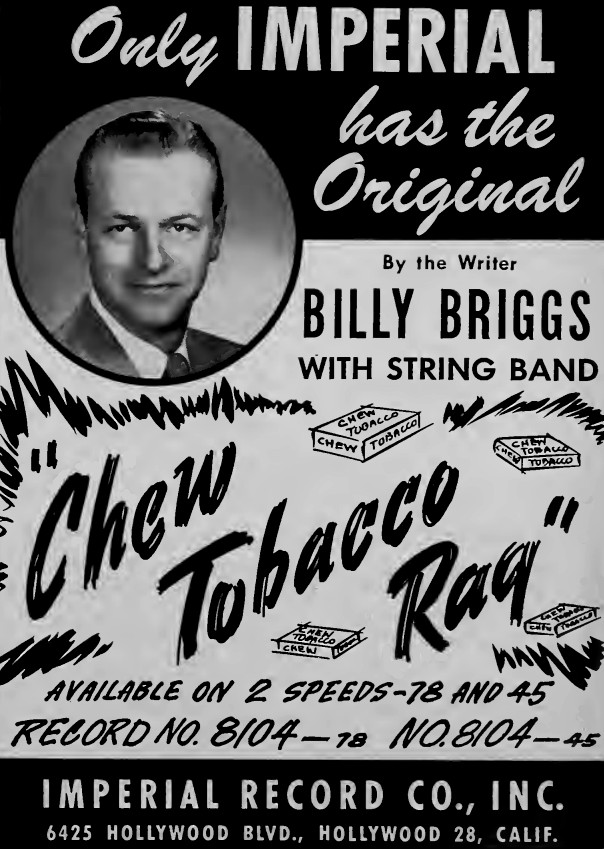
CASH BOX — MARCH 10, 1951
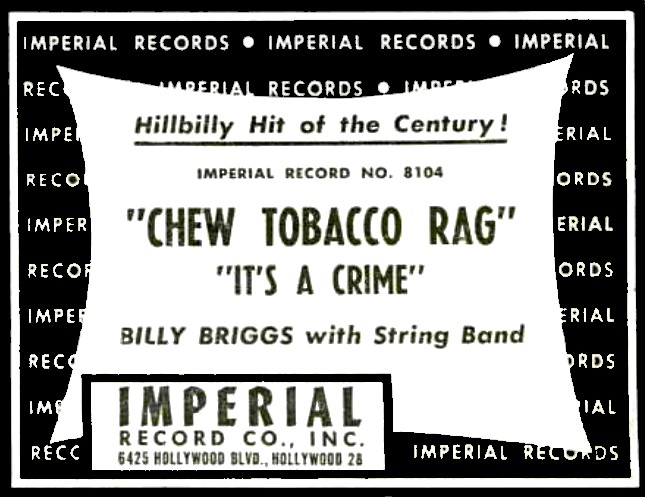
|
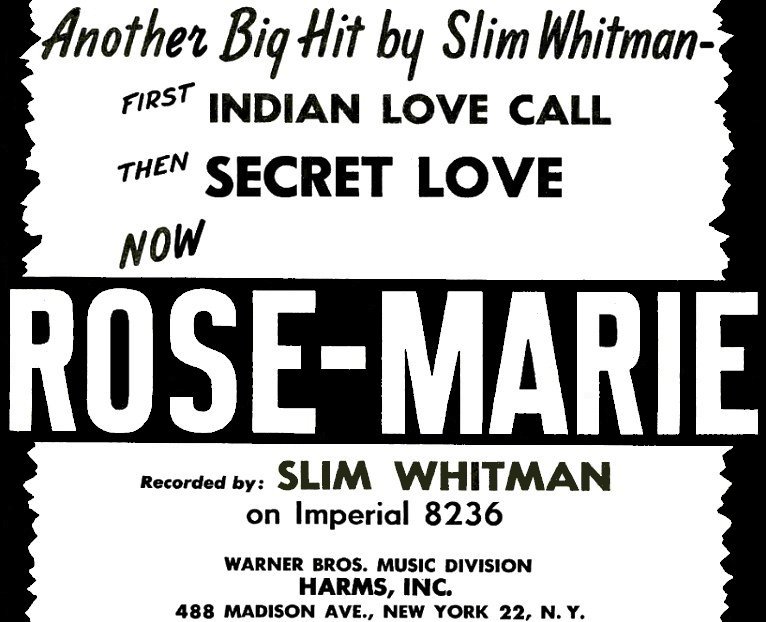
|
SLIM WHITMAN
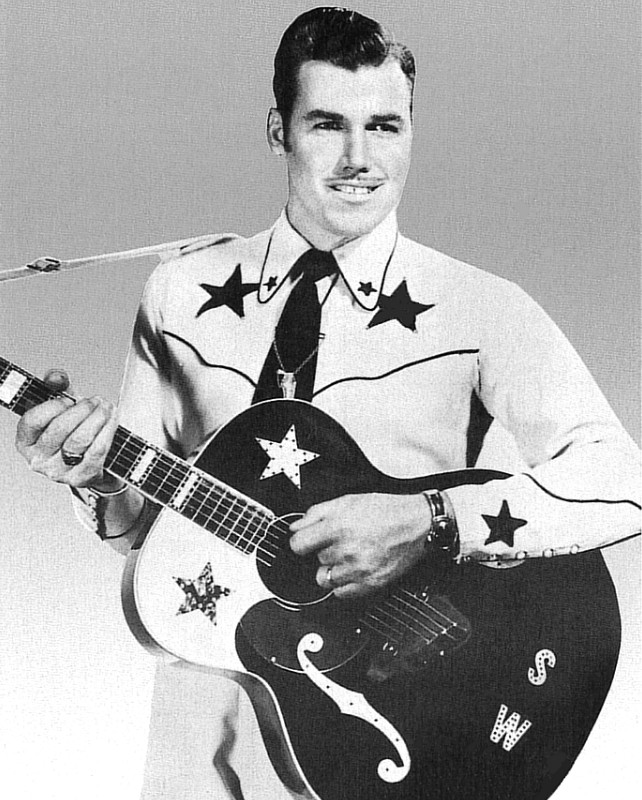
|
Above: Photo of Slim Whitman, who was a singer, guitarist, and composer. His first records were on RCA Victor. Slim moved to Imperial in 1951 and stayed with them throughout the 1950s and 1960s. He had many hits for Imperial, the biggest and most well-known being "Indian Love Call" in 1952. THE BILLBOARD, November 24, 1951: IMPERIAL DISKERY INKS SLIM WHITMAN
HOLLYWOOD—Imperial Records' Prexy Lou Chudd inked Slim Whitman to a two-year pact. Whitman etched four sides with his own ork, for release December 1.The former Victor artist is from Shreveport, La., where he is featured on the "Louisiana Hayride".
Chudd next week leaves for a two-week jaunt thru Texas, Louisiana, and Chicago, where he will cut western and rhythm and blues talent. A second session with Whitman is on tap when Chudd hits Shreveport the end of the month.
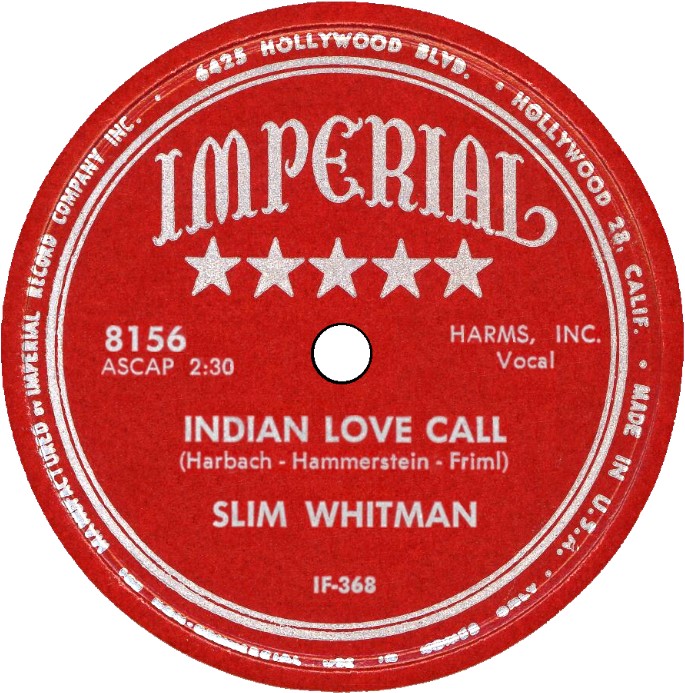
|
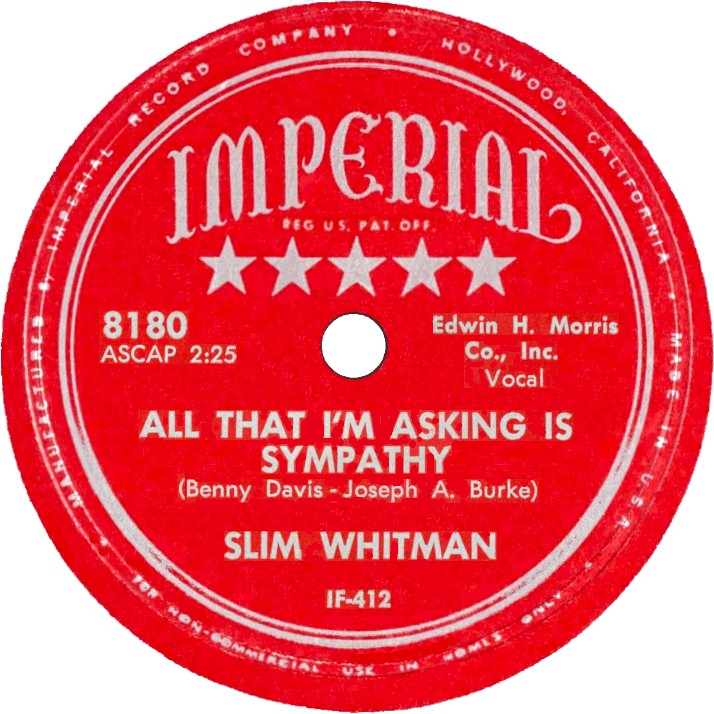
|
Above Left: Label image for Imperial 8156, released in 1952. The Imperial 8000 series was reserved for folk and country and western records. Above Right: Label image for Imperial 8180, released in 1953.
LISTEN (Windows Media Player):
1. "Indian Love Call" - Slim Whitman - Imperial 8156 - 1952.
2. "China Doll" - Slim Whitman - Imperial 8156 - 1952.
3. "All That I'm Asking Is Sympathy" - Slim Whitman - Imperial 8180 - 1953.ALL THREE SONGS played in sequence.
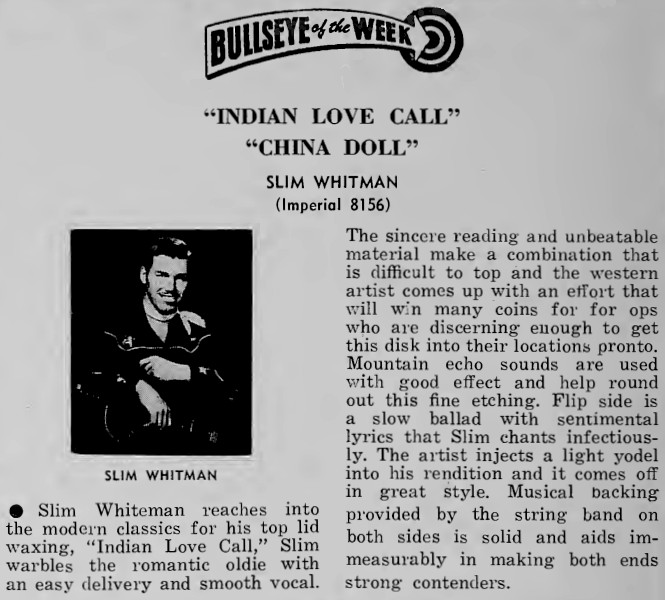
|
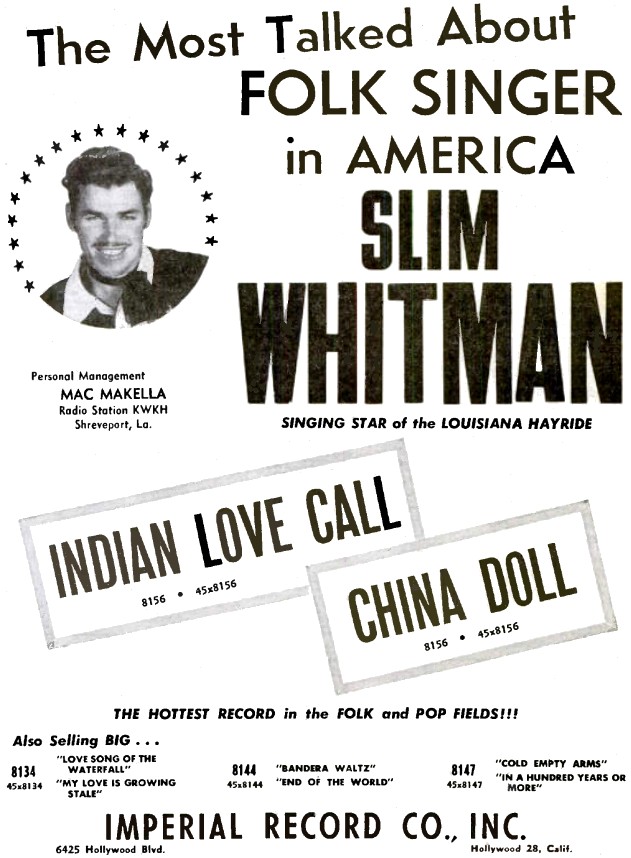
|
SAN ANGELO STANDARD TIMES (San Angelo, TX), July 27, 1952:
....Long-time western crooner, with a little hillbilly singing on the side, Whitman has been dubbed "record sales king of the Southwest".... Whitman claims much of his success is due to the accompaniment given him by the Little Stardusters. Most popular of the group is Hoot Evans, who plays his "weird electric steel".THE TIMES (Shreveport, LA), October 19, 1952:
SLIM WHITMAN RECORDING STILL RIDING HIGH
The number four "pop" song in Pittsburgh! Number 7 in Chicago, number 7 in Washington, D.C.! Who is it? Bing Crosby, Frankie Lane, Guy Mitchell? No! It's the Louisiana Hayride's own Slim Whitman. Slim's unusual recording of the "Indian Love Call," originally intended as a "folk" or "country" version of this old favorite, is climbing right to the top with the "pop" audiences in many of the nation's largest and most cosmopolitan cities.Currently "Indian Love Call" is number nine out of 30 on the national list of most played juke box records in the "pop" category, number 3 in the most played juke box (country and western) category, number 5 on the most played by folk disc jockeys and number 2 on best selling country and western records and at the same time is number 17 on the best selling "pop" list.
This is most unusual. Many "folk" songs become favorites of the "pop" audience but seldom does the same artist appear on both lists simultaneously. Patti Page's "Tennessee Waltz", Hank William's "Cold Cold Heart", "Tex Ritter's "High Noon" are a few that have had this distinction and now Slim Whitman's "Indian Love Call" has been added to this select list.
For some three years Slim has been one of the featured stars of the "Louisiana Hayride", KWKH's nationally-known Saturday night folk music show originating in the Shreveport Municipal auditorium. Slim's high tenor voice, amazing range and perfect control have made him a favorite with millions. Although his voice is suited to practically any type of song, Slim prefers the simpler folk and country songs.
His latest release on Imperial records is "Waters of the Minnetonka" as a follow up to "Indian Love Call". This record has been out only a few weeks and is already attracting national attention. In addition Slim has recorded "Amateur in Love", "Love Song of the Waterfall", "Bandera Waltz", and many others.
Slim returned to the "Hayride" last night after an absence of several weeks during which he played several engagements on the west coast. He is presently booked for appearances in Boston and Pittsburgh and is even considering an appearance of several days in Hawaii.
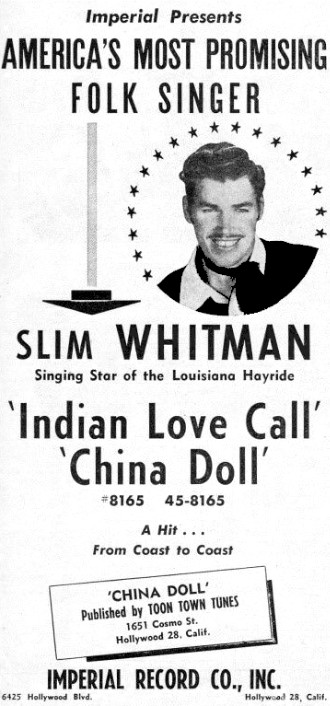
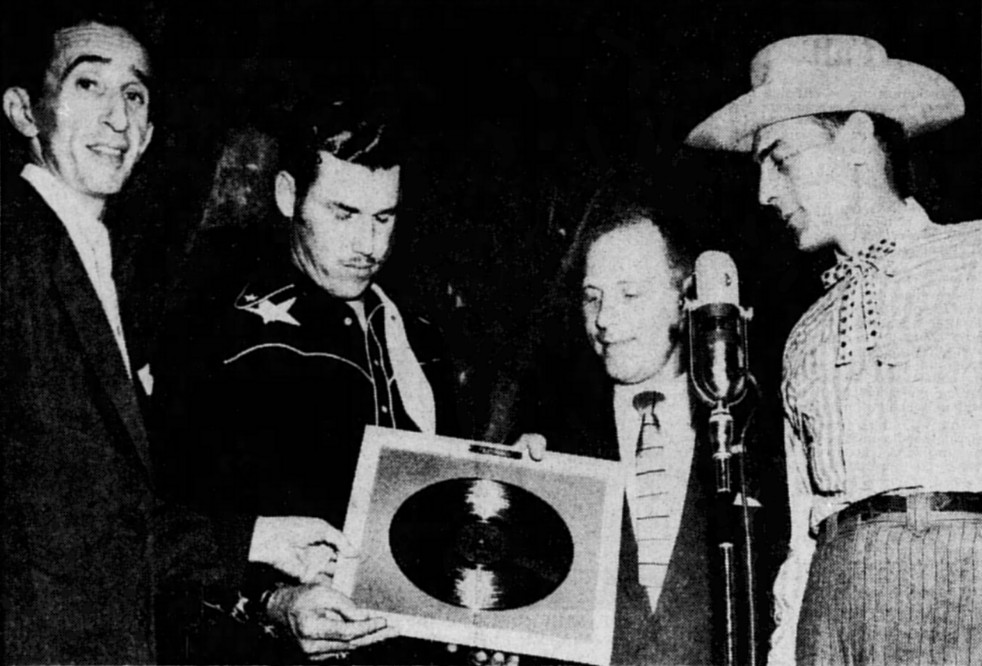
|
Above: THE TIMES, (Shreveport, LA), June 3, 1953:
A MILLION RECORD SALES ARE A SINGER'S BEST FRIEND
Seems to be the considered opinion of these gentlemen admiring Slim Whitman's latest decoration for his living room wall, a Gold Award Disk for the millionth sale of his "Indian Love Call".Left to right, they are Lewis R. Chudd, president of Imperial Records, who flew in from Hollywood last Saturday to make the presentation at the "Louisiana Hayride", the singing star himself, O. K. Makela, Whitman's business manager, and Horace Logan, emcee and producer of KWKH's "Louisiana Hayride" radio program, a Saturday night "must" in the Ark-La-Tex.
Only fellow lacking recognition was Rudolf Friml, the composer who wrote "Indian Love Call" for the score of the operetta "Rose Marie", now being filmed again in Hollywood with Ann Blyth starred.
(NOTE: The song "Rose-Marie", from this operetta, was released on Imperial 8236 by Slim Whitman in 1954.
The 1954 M-G-M film, "Rose Marie", starred Ann Blyth and Howard Keel.)
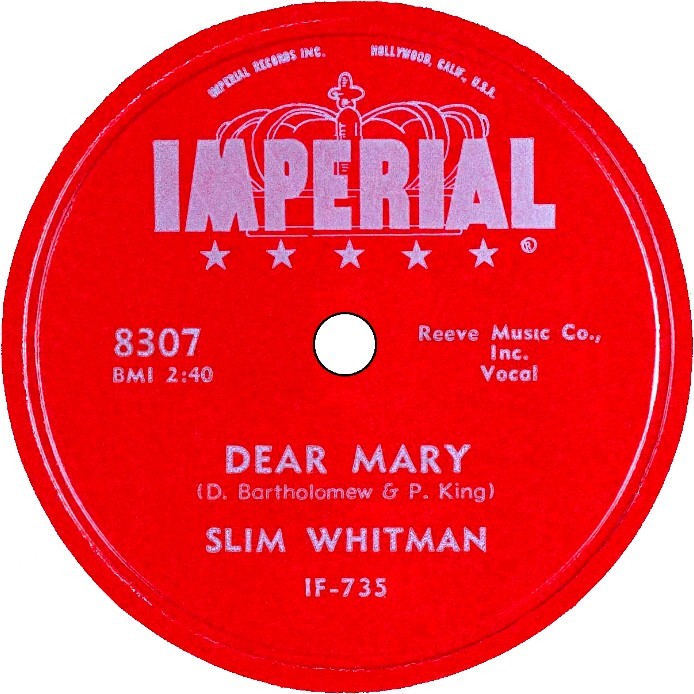
|
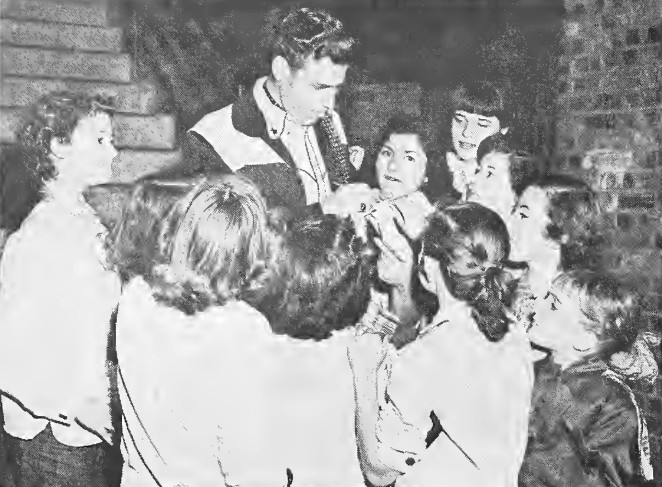
|
Above Left: Label image for Imperial 8307, released in 1956. Above Right: CASH BOX, July 21, 1956: BRITISH FANS GREET WHITMAN
LONDON—Imperial Records artist Slim Whitman was greeted by crowds of fans at every city during his recent tour of the British Isles. Whitman is one of the most popular American artists to visit the British Isles and did sell-out business during the entire tour.One of the phenomenal record sellers of all time, Whitman sold over four million copies of "Indian Love Call", three million of "Rose Marie", and has sold a total of over ten million records in the past four years.
The Billboard Review (7-21-56):
SLIM WHITMAN — Imperial 8307
The Whiffenpoof Song (78) The great standard gets a very solid vocal by Whitman, whose reading catches all the beauty of the lyric. Whitman fans will enjoy this.
Dear Mary (75) Slim Whitman does this pretty waltz-time tune in his unique style. Nice coupling.
(NOTE: Ratings had a range of 0-100 with 70-79 considered as "good".)LISTEN (Windows Media Player):
1. "Dear Mary" - Slim Whitman - Imperial 8307 - 1956.
2. "The Whiffenpoof Song" - Slim Whitman - Imperial 8307 - 1956.BOTH SONGS played in sequence.
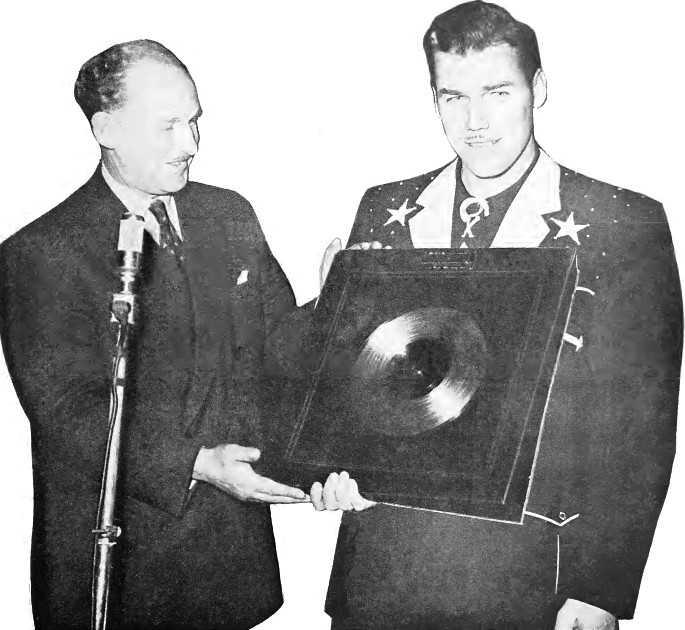
|
Above: CASH BOX, September 1, 1956:
CAPTION:Imperial Records' Slim Whitman is shown receiving a gold record from W. W. Townsley, executive vice president of Decca Record Co., Ltd, of London, England, for having sold over two million records in Great Britain in the past year. One of the most popular American artists in England, Whitman recently completed a sell-out tour of the British Isles.
Whitman's new Imperial release of "The Whiffenpoof Song" and "Dear Mary" looks as though it may join the ranks of his best selling "Indian Love Call" and "Rose Marie" both here and abroad.
ARTISTS WITH RECORDS ON IMPERIAL'S 5000 R&B SERIES (1953-1954)
(Imperial Records - Part Two includes a list of artists for 1951-1952)
Gene Gilmore
T-Bone Walker
Lil' Son Jackson
Big Jay McNeeley And His Orchestra
Fats Domino
Bea Booker
Tommy Ridgley
Smiley Lewis
Little Bubber
Fat Man Matthews
Rose Mitchell
Blazer Boy
Bobby Mitchell And The Toppers
Dave Bartholomew
The Love Notes
Jesse Allen And Audrey Walker
The Spiders
The Hawks
Smokey Hogg
Little Sonny Jones
Guitar Slim
Pee Wee Crayton
Little Booker
Dave Collins And The Scrubs
Blanche Thomas
The Pelicans
The Bees
SMILEY LEWIS (CONTINUED)
(This is the second, and final, spotlight on Smiley. The first is in the Imperial Records - Part Two article.)
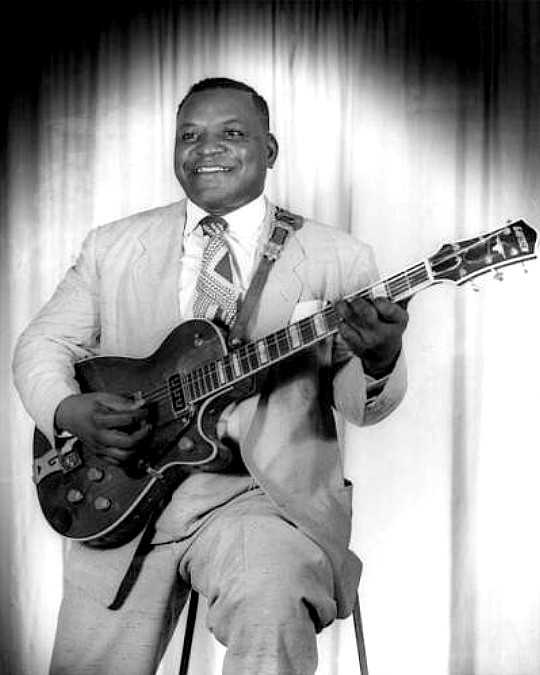
|
Above: Photo of Smiley Lewis. Smiley's achievements always seemed to be overshadowed by Fats Domino's great success. But, for sure, Smiley was a huge factor in Imperial Records' success! He had twenty-seven records on the label from 1950 to 1958, sixteen of those in the years 1953 to 1956.
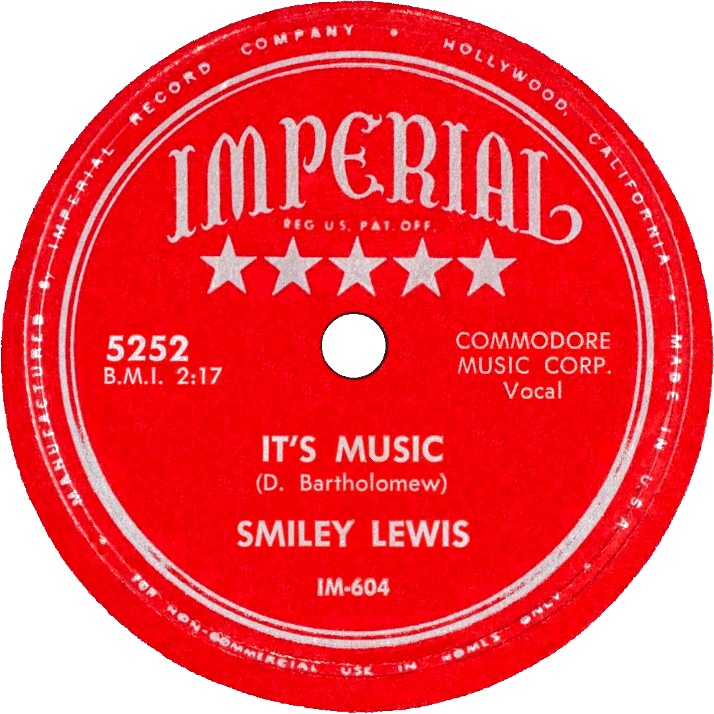
|
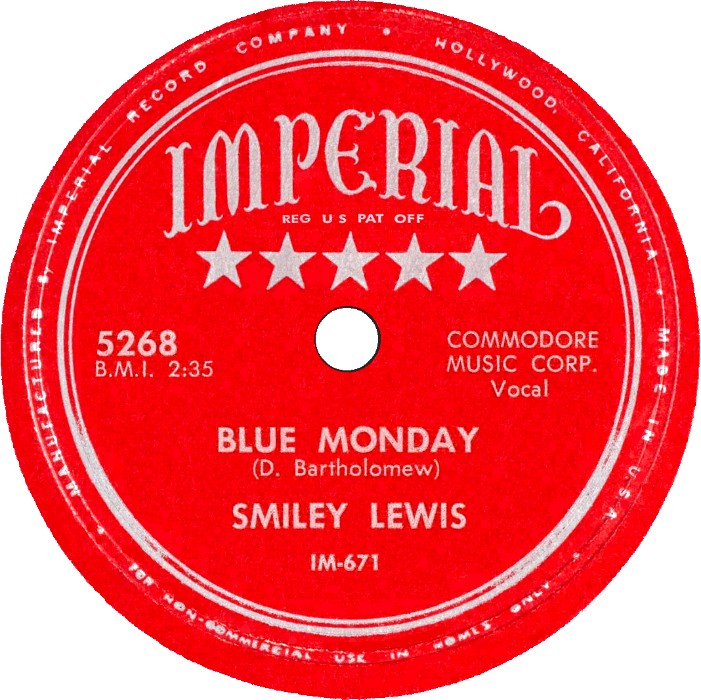
|
Above Left: Label image for Imperial 5252, released in 1953. The flip-side is "Little Fernandez", a poor attempt (in my opinion) at a calypso song. Above Right: Label image for Imperial 5268, released in 1954. Fats Domino released his version of "Blue Monday" on Imperial in 1956 (see further below).
The flip-side is "Down The Road", a song composed by Smiley Lewis and Dave Bartholomew. "Rampart Street" is mentioned in this song. That is where the only recording studio in New Orleans available for r&b artists was located. Dave Bartholomew and his group of musicians became the studio's house band there.
LISTEN (Windows Media Player):
1. "It's Music" - Smiley Lewis - Imperial 5252 - 1953.
2. "Blue Monday" - Smiley Lewis - Imperial 5268 - 1954.
3. "Down The Road" - Smiley Lewis - Imperial 5268 - 1954.ALL THREE SONGS played in sequence.
Above Left: THE BILLBOARD, September 12, 1953.
NOTE: The calypso flip-side is not mentioned.Above Center: THE BILLBOARD, April 24, 1954.
NOTE: "Down The Road" got top billing over "Blue Monday" on this ad and the one at the right. This is one section of a full-page layout that Imperial Records took out in The Billboard.Above Right: THE BILLBOARD, February 20, 1954.
NOTE: "New Cat Hit"? Seems that, at the time, "cat music" was a term used in the South for rhythm and blues that was targeted to white audiences. Reference: Dave Bartholomew's record "Cat Music" included further down this webpage.
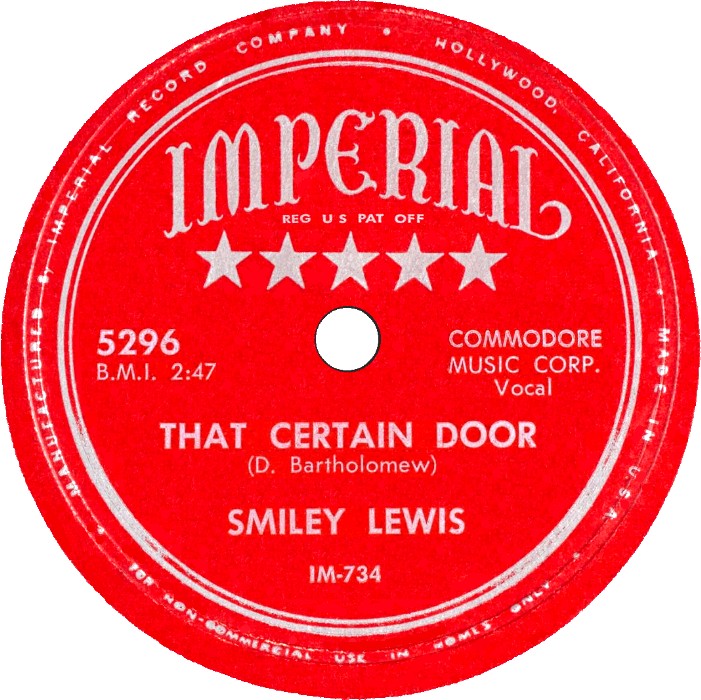
|
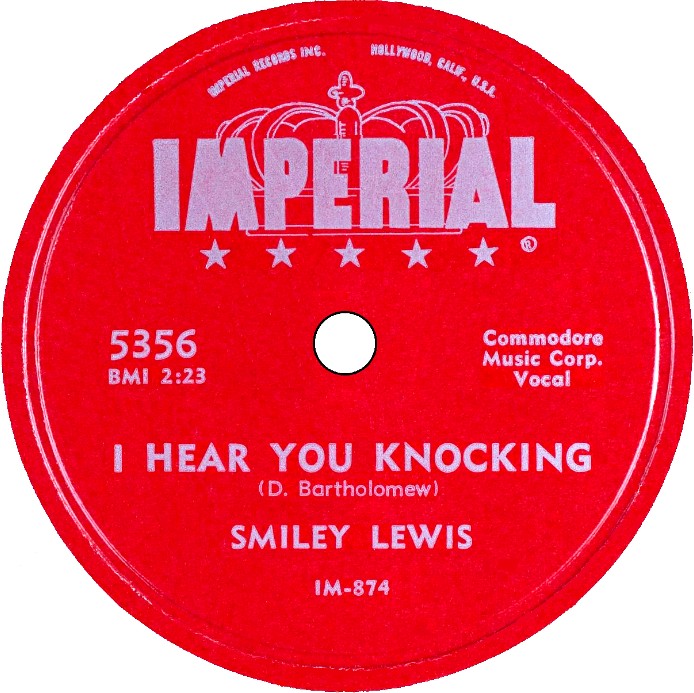
|
Above Left: Label image for Imperial 5296, released in 1955. Wonder if it's that certain door that she's knocking on? Above Right: Label image for Imperial 5356, released in 1955. While the majority of references to this song are "I Hear You Knockin'", the label states "....Knocking". Even Fats Domino's record of the song, issued in the 1960s, showed the "g" on the label. On that one, "Domino" was added as a credited composer. BMI credits the song to Dave Bartholomew and Pearl King, but no Fats Domino. Pearl King, who was Dave Bartholomew's wife, was a co-composer on many of his songs.
THE BILLBOARD, March 9, 1955: THIS WEEK'S BEST BUYS
SMILEY LEWIS — I HEAR YOU KNOCKIN' — Imperial 5356
Building slowly, but surely, over the past five weeks, this disk is within striking distance of the national charts. Areas reporting particularly heavy sales now include New Orleans, Atlanta, Charlotte, Durham, Chicago, St. Louis, Nashville, Baltimore, Cleveland and Philadelphia.THE BILLBOARD, June 18, 1955:
....Imperial Records is now one of the hottest labels in the country with such hits as Fats Domino's "Ain't It A Shame", The Jewels' "Angel In My Life", and Smiley Lewis' "Real Gone Lover"....Cash Box Review (7-30-55):
SMILEY LEWIS — Imperial 5356
I Hear You Knockin' (B+) Smiley Lewis hears her knocking but won't let her in. A slow rocking blues given a very strong vocal treatment. Lewis gives this tune a lot of drive and the item could stir up strong action. Watch it closely.
(NOTE: A rating of B+ was considered as "excellent".)The Billboard Review (7-30-55):
SMILEY LEWIS — Imperial 5356
I Hear You Knockin' (74) An expressive vocal job on bluesy weeper with a pounding beat.
(NOTE: Ratings had a range of 0-100 with 70-79 considered as "good".)THE BILLBOARD, September 10, 1955:
....The only labels with more than one disk on the r&b chart are Imperial (Fats Domino and Smiley Lewis); King (Jack Dupree and Earl King); and Atlantic (Ray Charles and Joe Turner)....LISTEN (Windows Media Player):
1. "That Certain Door" - Smiley Lewis - Imperial 5296 - 1954.
2. "I Hear You Knocking" - Smiley Lewis - Imperial 5356 - 1955.BOTH SONGS played in sequence.
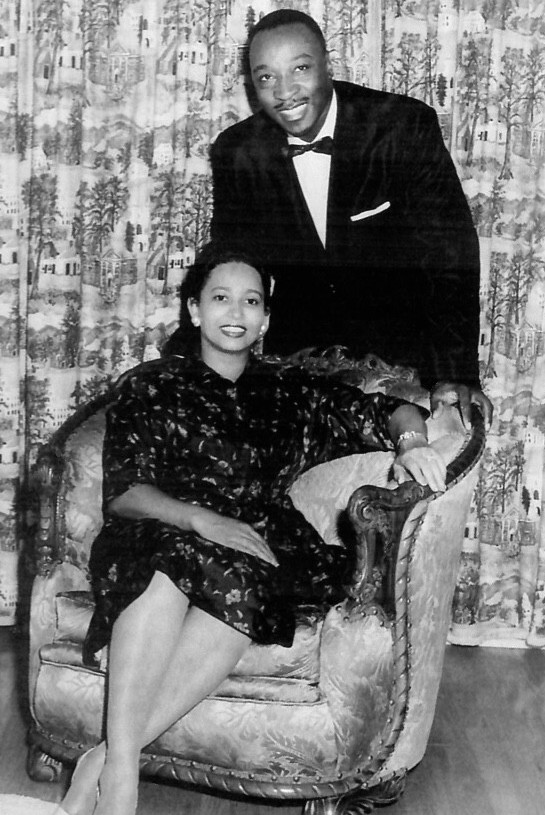
PEARL KING AND DAVE BARTHOLOMEW
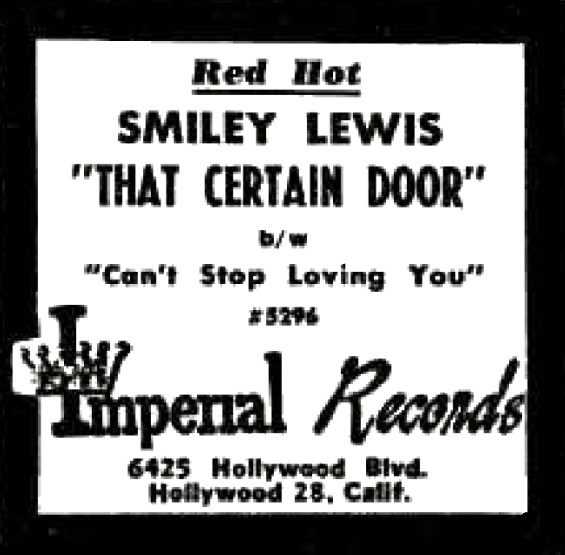
|
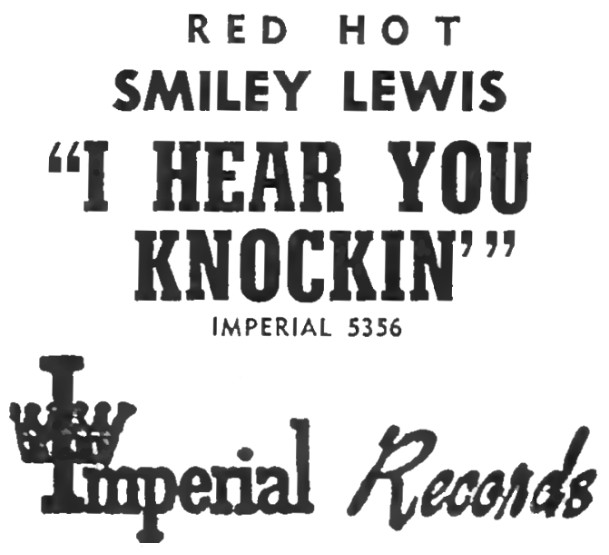
|
Above Left: THE BILLBOARD, August 7, 1954.
Above Right: CASH BOX, August 7, 1955.
Above Left: CASH BOX, July 17, 1954.
NOTE: Someone at Imperial forgot to include "Red Hot" on this one!Above Middle: Photo of Smiley Lewis smiling.
Above Right: THE BILLBOARD, August 7, 1955.
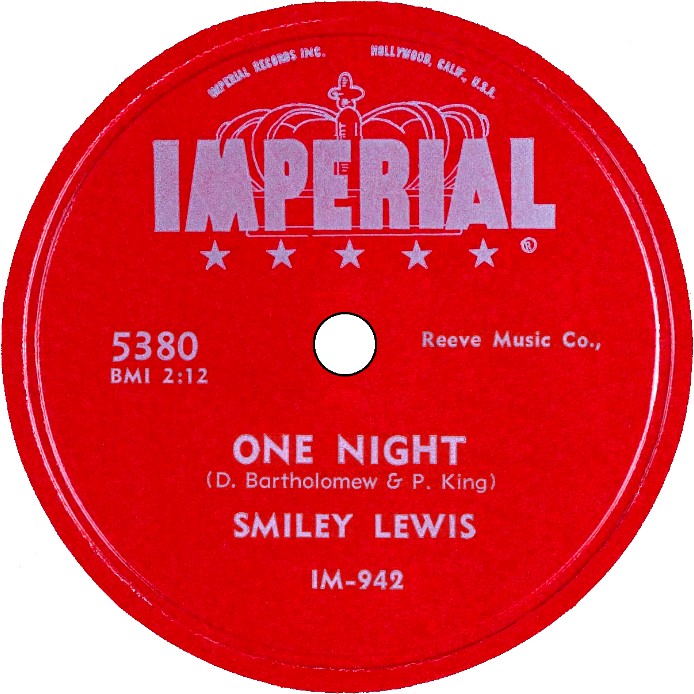
|
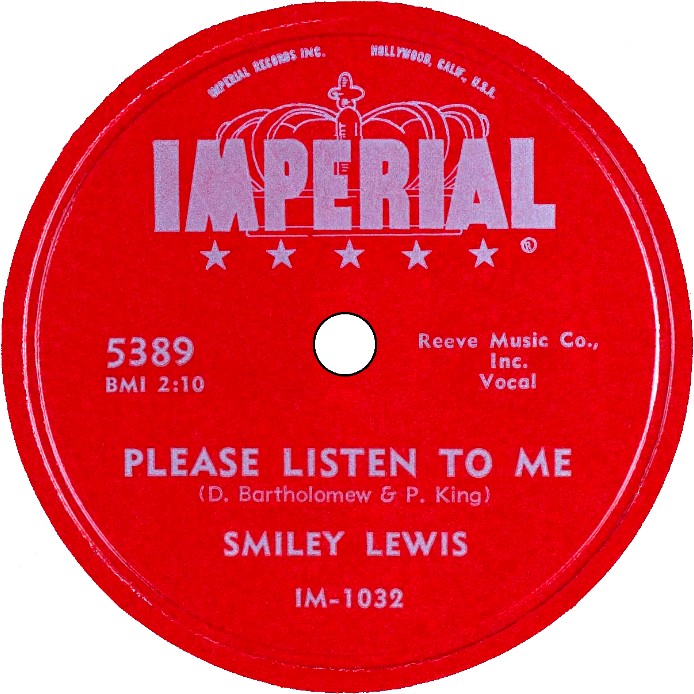
|
Above Left: Label image for Imperial 5380, released in 1956. Elvis released a cleaned up version of "One Night" in 1957 with "One night with you is what I'm now praying for" replacing "One night of sin is what I'm now paying for". Above Right: Label image for Imperial 5389, released in 1956. The flip-side is "She's Got Me Hook, Line & Sinker". All four sides of the above records were composed by Dave Bartholomew and Pearl King.
THE BILLBOARD, February 18, 1956: REVIEW SPOTLIGHT ON...
SMILEY LEWIS — ONE NIGHT — Imperial 5380
....the "One Night" opus is a deep and moving hymn of shame, sung in genuine pleading tones. ....has shades of "O Sole Mio". ....sock potential.CASH BOX, February 18, 1956:
....Imperial Records feels it has another big hit in "One Night" by Smiley Lewis....
.... Smiley Lewis in town for a short stay. His new release of "One Night" is starting to break in several markets....THE BILLBOARD, April 28, 1956: REVIEW SPOTLIGHT ON...
SMILEY LEWIS — SHE'S GOT ME HOOK, LINE AND SINKER/PLEASE LISTEN TO ME — Imperial 5389
Lewis has been a big man on the charts in the past and he may do it again with this platter. He wraps up "She's Got Me Hook, Line and Sinker " - a clever rhythm ditty - in a sock vocal. The flip, a pretty ballad, is dressed up in a warmly sincere reading by Lewis.CASH BOX, May 12, 1956:
....Smiley Lewis' new Imperial record of "Please Listen To Me" could be another "I Hear You Knocking" for him....THE BILLBOARD, May 19, 1956: THIS WEEK'S BEST BUYS
SMILEY LEWIS — SHE'S GOT ME HOOK, LINE AND SINKER/PLEASE LISTEN TO ME — Imperial 5389
Lewis is coming up quickly now with this two-sided threat. Excellent reports are being returned on both sides, with the disk racking up very good sales in New Orleans, Memphis, Nashville, Durham, Baltimore, St. Louis, Detroit and Philadelphia in the past two weeks.CASH BOX, June 2, 1956:
....Both sides of the new Smiley Lewis Imperial record have been covered by pop artists, one side by Dorothy Collins and the other by Gale Storm....
(NOTE: Dorothy Collins cover was "He's Got Me Hook, Line And Sinker". It seems that Gale Storm did not cover the flip-side, "Please Listen To Me", but she had covered Smiley's "I Hear You Knocking" in 1955.)CASH BOX, June 30, 1956:
....Lew Chudd on the road for ten days promoting Imperial's hits including, "A-l In My Heart" by The Spiders, and Smiley Lewis' "Please Listen To Me"....LISTEN (Windows Media Player):
1. "One Night" - Smiley Lewis - Imperial 5380 - 1956.
2. "Please Listen To Me" - Smiley Lewis - Imperial 5389 - 1956.
3. "She's Got Me Hook, Line & Sinker" - Smiley Lewis - Imperial 5389 - 1956.ALL THREE SONGS played in sequence.
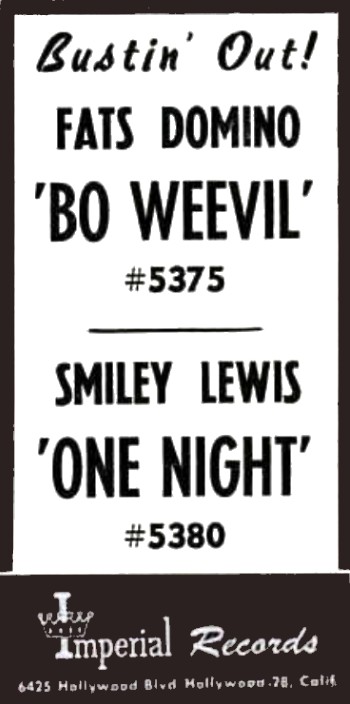
THE BILLBOARD — FEBRUARY 26, 1956
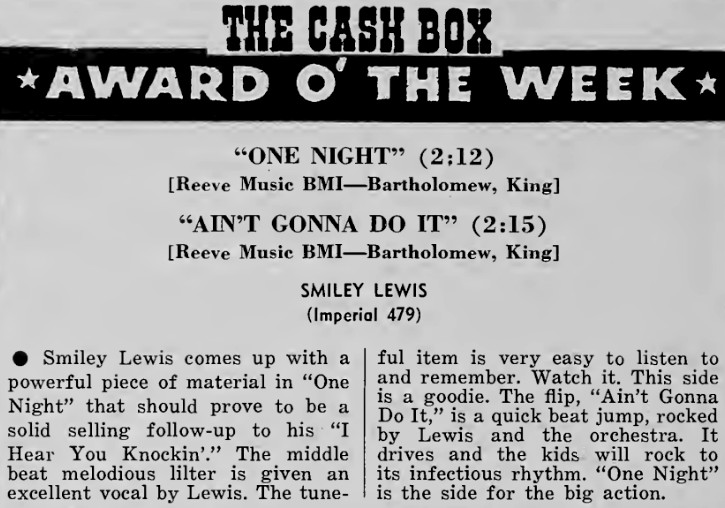
|
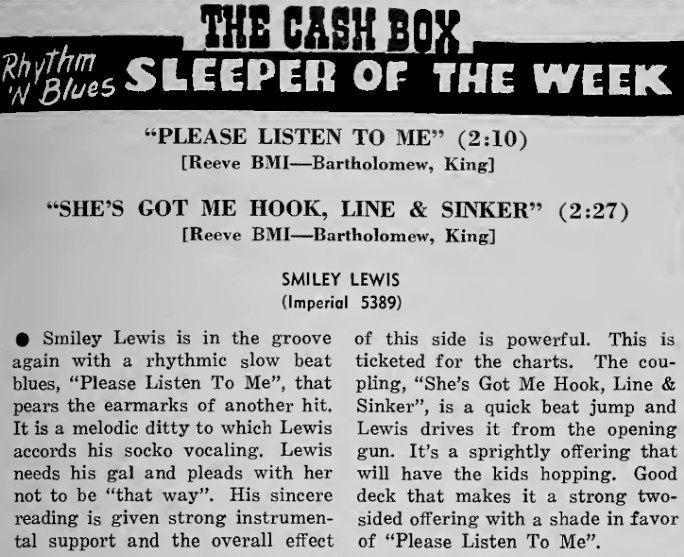
|
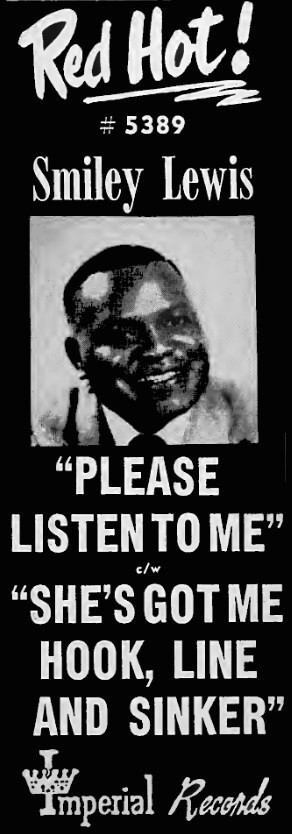
|
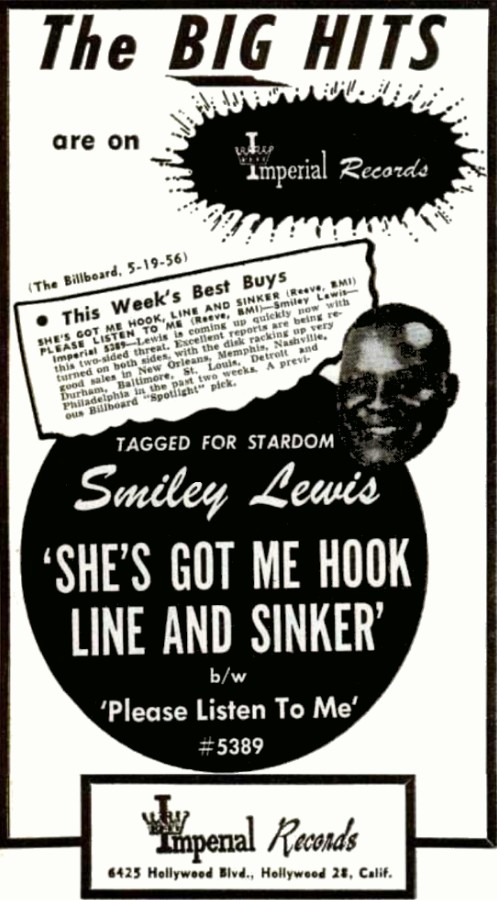
|
Above Left: CASH BOX, May 26, 1956.
NOTE: Imperial Records, the "Red Hot" label... and they actually were. Full ads for this record were put in both Cash Box and The Billboard in the same week.Above Right: THE BILLBOARD, May 26, 1956.
NOTE: It seems that Imperial could not decide which song was the "A" side.
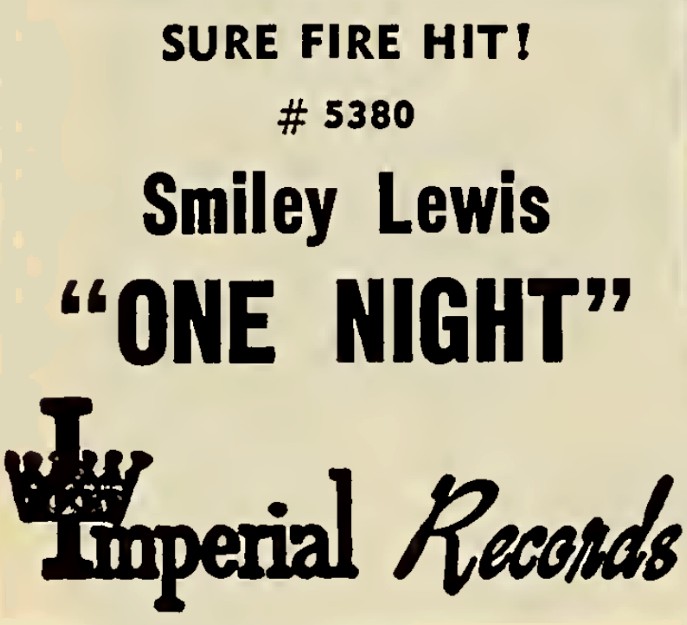
|
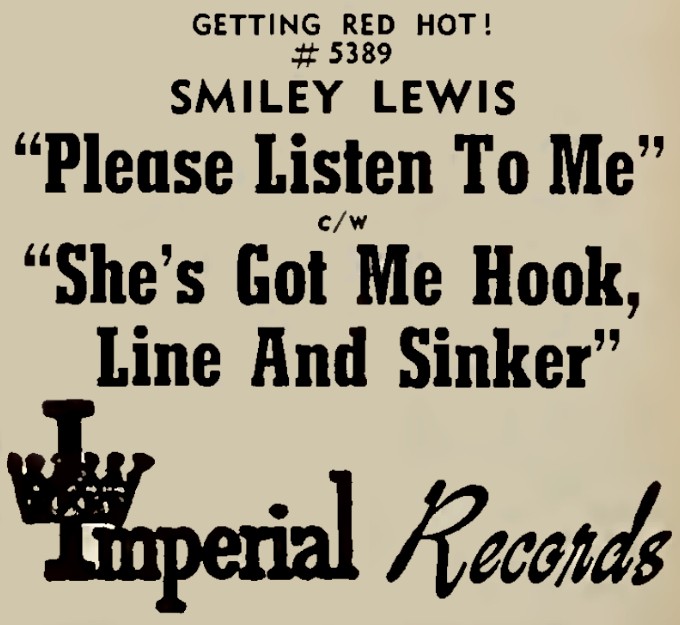
|
Above Left: CASH BOX, March 10, 1956.
Above Right: CASH BOX, June 6, 1956.
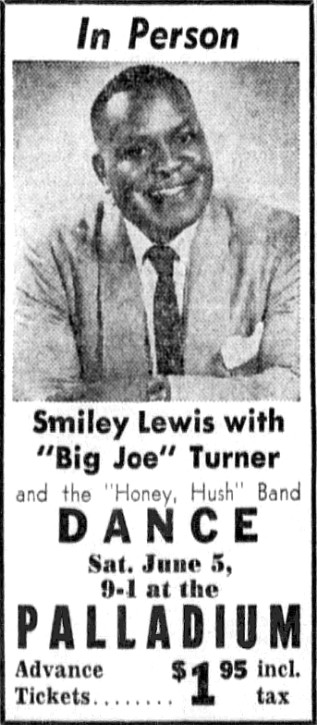
|
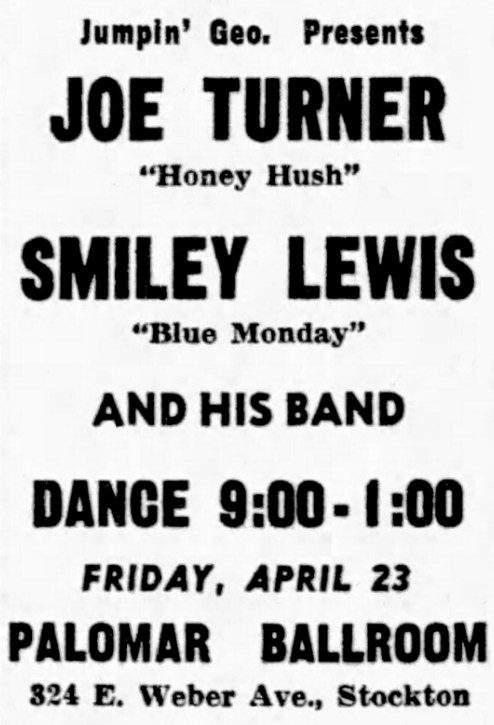
|
Above Left: EL PASO TIMES, June 5, 1956.
NOTE: Joe Turner had been with Imperial Records with releases on the label in 1950 and also on affiliated Bayou Records in 1953. These are included in the Imperial Records - Part One article.Above Right: STOCKTON DAILY EVENING RECORD (Stockton, CA), April 19, 1956.
EXTRA RECORD — BLUE MONDAY
Above Left: Label image for Imperial 5417, released in December 1956. BMI credits Dave Bartholomew as the lone composer of this song. However, Fats Domino may have contributed to his version of the song. This record was a double-sided hit with "What's The Reason I'm Not Pleasing You" on the flip-side. Above Middle: THE BILLBOARD, December 29, 1956.
Above Right: Sheet Music for the song "Blue Monday". Fats Domino was in the 1956 20th Century-Fox picture, "The Girl Can't Help It", singing "Blue Monday". The other photos shown are actors that are in the movie. This film features many rock and roll acts, including Little Richard singing the title song.
LISTEN (Windows Media Player):
"Blue Monday" - Fats Domino - Imperial 5417 - 1956.
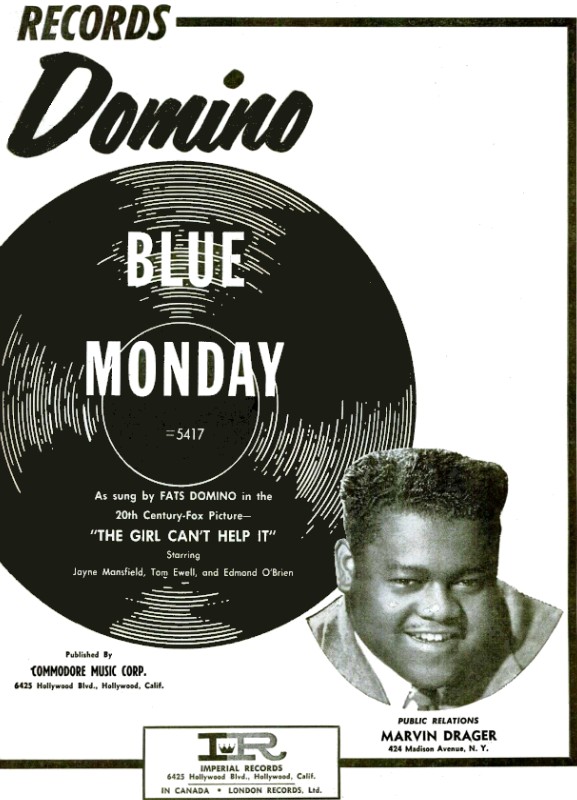
|
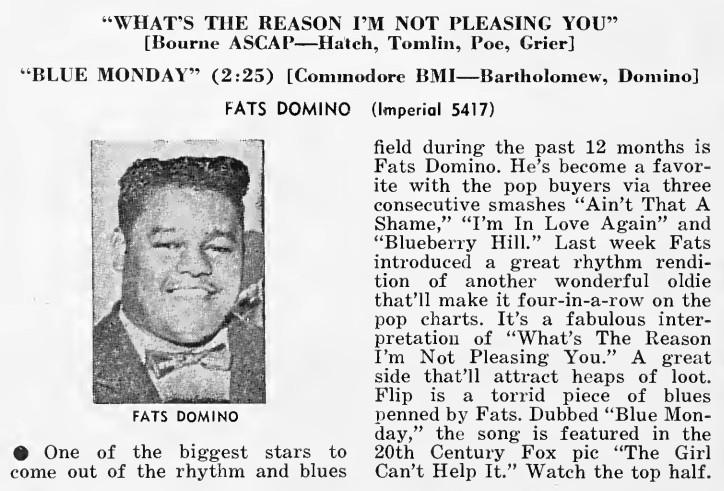
(As previously stated, BMI credits Dave Bartholomew as the lone composer of "Blue Monday", but |
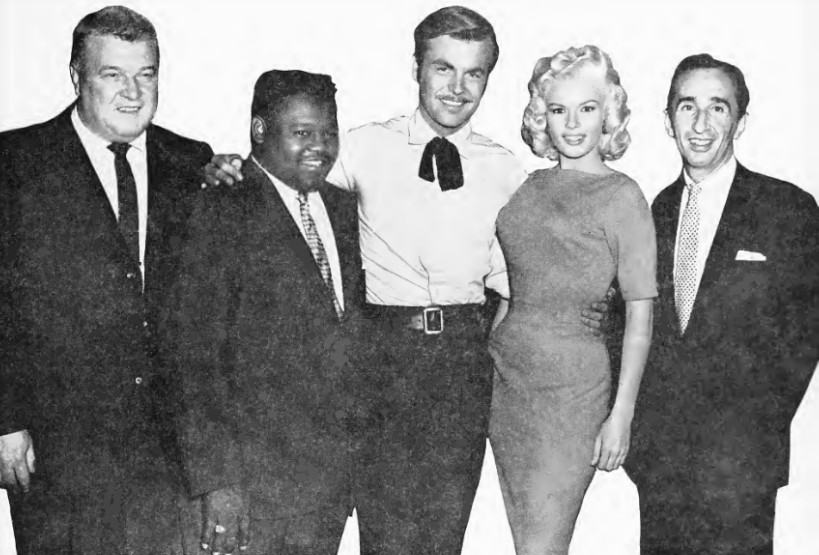
|
Above: CASH BOX COVER, February 9, 1957:
CAPTION: Fats Domino has really come into his own in the past couple of years. He has become one of the hottest artists in both the Pop and Rhythm and Blues fields. Now he caps his rise with an appearance in the Twentieth Century-Fox film, "The Girl Can't Help It". Pictured above are Jack Archer, vice president of Shaw Artists; Fats Domino, Robert Wagner, and Jayne Mansfield, who appear in the picture; and Lew Chudd, head of Imperial Records, the firm Domino records for. His latest release, "Blue Monday," is from the film.
NOTE: THERE WILL BE MORE FATS DOMINO IN THE NEXT PART OF THIS ARTICLE.
Click HERE for an article about FATS DOMINO'S EARLY YEARS by Marv Goldberg. (Will open in a separate window)
BOBBY MITCHELL AND THE TOPPERS
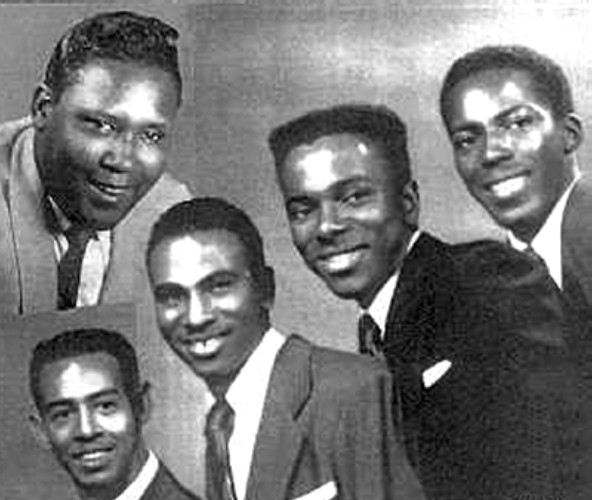
|
Above: Bobby Mitchell And The Toppers, consisting of Bobby Mitchell (lead tenor), Lloyd Bellaire (tenor), Frank Bocage (bass), Joseph Butler (baritone), and Gabriel Fleming (tenor, piano).
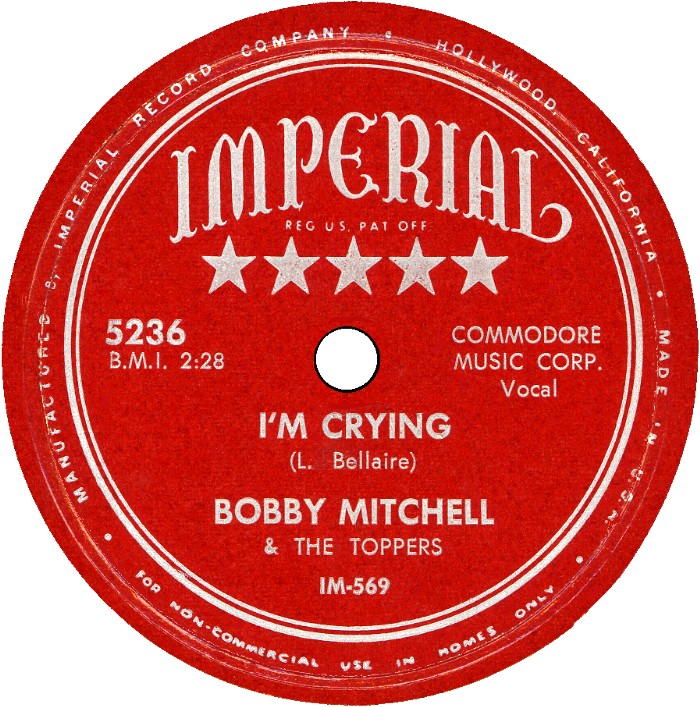
|
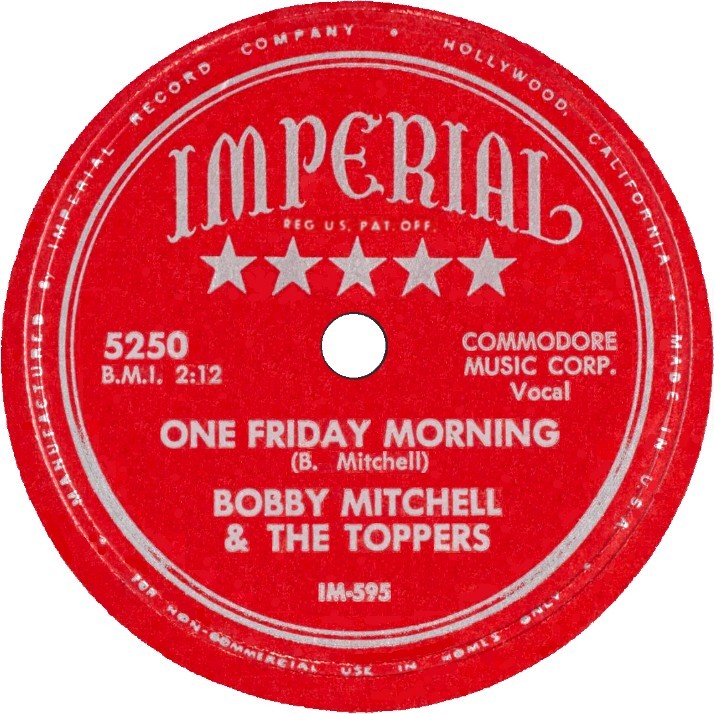
|
Above Left: Label image for Imperial 5236, released in April 1953. This is the first of ten releases (as a vocal group) that Bobby Mitchell And The Toppers had on Imperial (1953-57). Afterward, Bobby continued to record for Imperial as a single artist. Lloyd Bellaire composed this side and Joseph Butler the flip side, "Rack 'Em Back", both members of The Toppers. Above Right: Label image for Imperial 5250, released in 1953. The flip-side, composed by "L. Bellaire", is "4 - 11 = 44". Per the song, his baby is at "Four Eleven And Forty-Four".
CASH BOX, June 6, 1953:
....Lew Chudd, Imperial Records prexy, off on a quick trip thru the Midwest and South, and then back to sunny Los Angeles. Don't know the exact figures, but we'd wager that Lew travels 100,000 miles a year.... Latter's Bobby Mitchell recording of "I'm Crying" starting to make noise around these parts....CASH BOX, May 23, 1953:
....New disk star that's gonna be heard for sure is Bobby Mitchell, who's first Imperial release "I'm Crying" is a natural. Advance orders for the platter are really pouring in....The Billboard Review (9/19/53):
BOBBY MITCHELL AND THE TOPPERS — Imperial 5250
4 - 11 = 44 (78) Bobby Mitchell and the Toppers hand this wild tune a solid reading. with the chanter selling the tune nicely while the group chants the title behind him. It's different enough to get some action, so watch it.
One Friday Morning (76) Another good job by the warbler, helped again by the Toppers and a solid beat from the ork. Mitchell talks as well as sings the lyrics.
(NOTE: Ratings had a range of 0-100 with 70-79 considered as "good".)LISTEN (Windows Media Player):
1. "I'm Crying" - Bobby Mitchell & The Toppers - Imperial 5236 - 1953.
2. "Rack 'Em Back" - Bobby Mitchell & The Toppers - Imperial 5236 - 1953.
3. "One Friday Morning" - Bobby Mitchell & The Toppers - Imperial 5250 - 1953.
4. "4 - 11 = 44" - Bobby Mitchell & The Toppers - Imperial 5250 - 1953.ALL FOUR SONGS played in sequence.
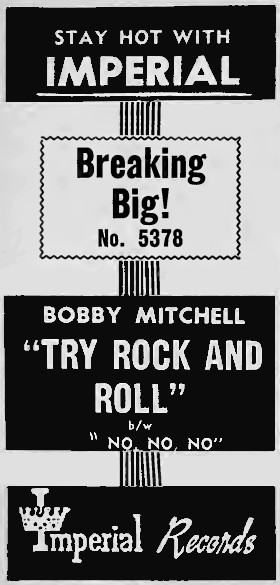
CASH BOX — FEBRUARY 11, 1956
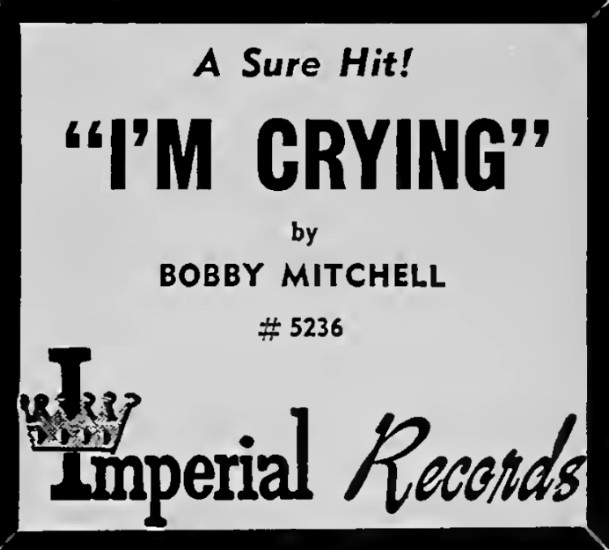
|
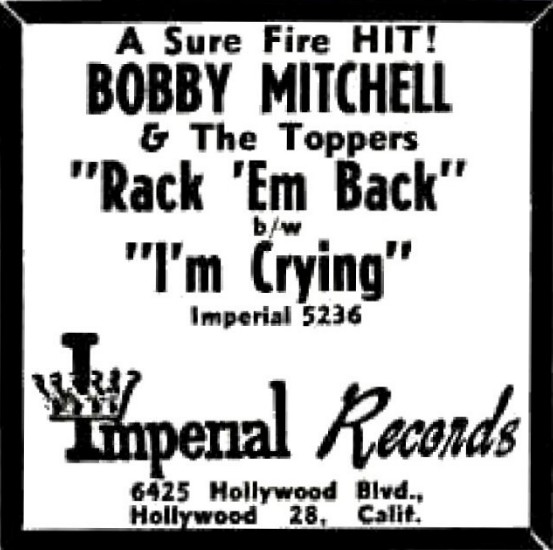
|
Above Left: CASH BOX, May 16, 1953.
NOTE: Somehow they left off "& The Toppers".Above Right: THE BILLBOARD, May 16, 1953.
NOTE: "Rack 'Em Back", not mentioned in the Cash Box ad of the same date, gets top billing here.
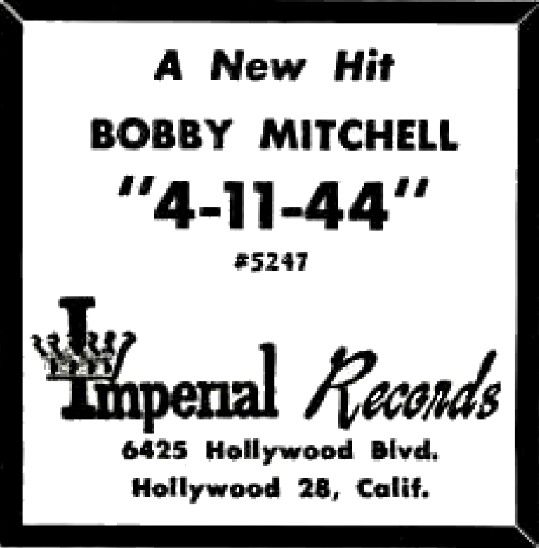
|
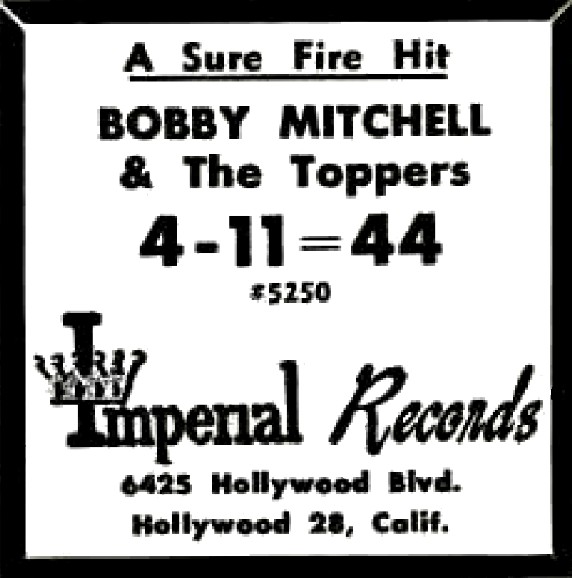
|
Above Left: THE BILLBOARD, August 15, 1953.
NOTE: The correct record number is "5250". The "5247" shown is a T-Bone Walker record.Above Right: THE BILLBOARD, September 12, 1953.
NOTE: Can you find four differences between these two clippings?
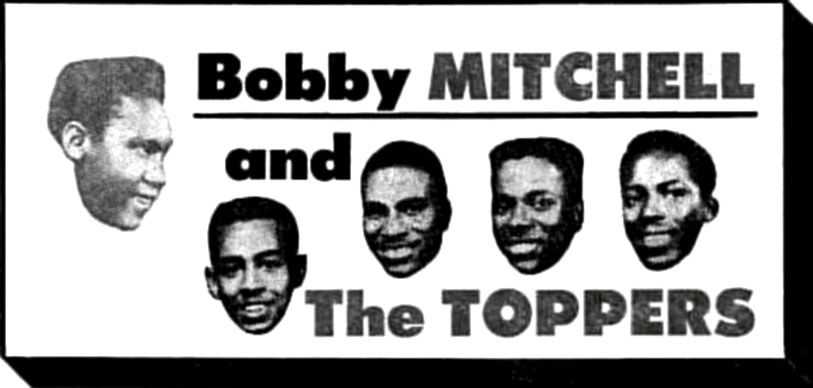
|
Above: Bobby Mitchell And The Toppers.
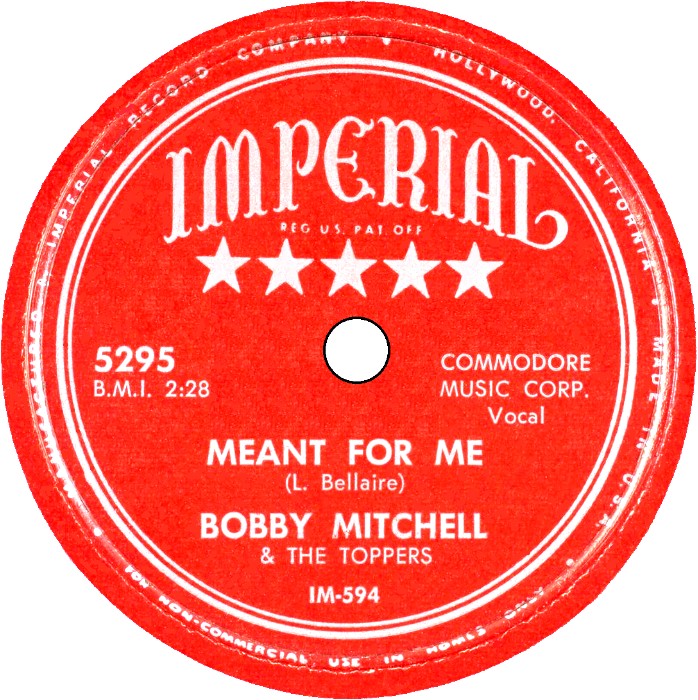
|
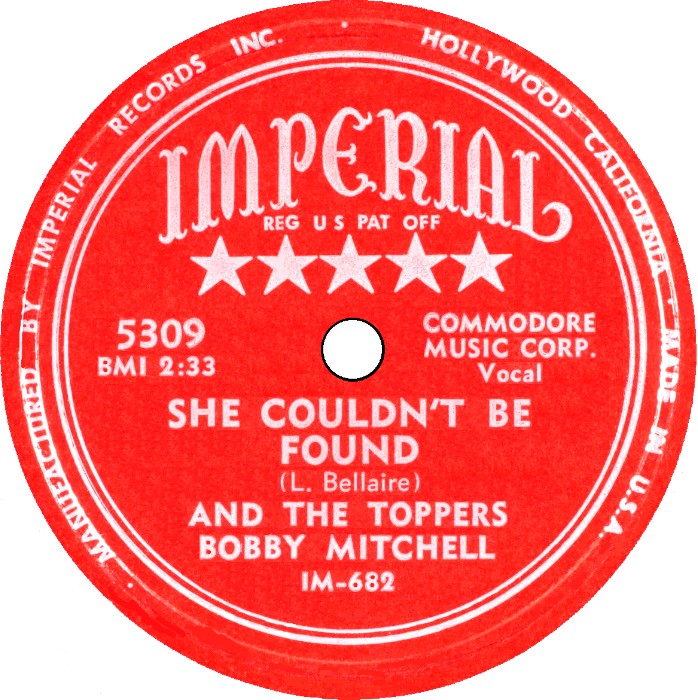
|
Above Left: Label image for Imperial 5295, released in April 1953. Although the label for the flip-side, "The Wedding Bells Are Ringing", shows "Bobby Mitchell & The Toppers", there is no vocal group singing heard. Above Right: Label image for Imperial 5309, released in 1953. The apparently misprinted label here shows "And The Toppers" on top. The flip-side label ("I'm A Young Man") shows their full name correctly.
LISTEN (Windows Media Player):
1. "Meant For Me" - Bobby Mitchell & The Toppers - Imperial 5295 - 1954.
2. "The Wedding Bells Are Ringing" - Bobby Mitchell & The Toppers - Imperial 5295 - 1954.
3. "She Couldn't Be Found" - Bobby Mitchell And The Toppers - Imperial 5309 - 1954.
4. "I'm A Young Man" - Bobby Mitchell And The Toppers - Imperial 5309 - 1954.ALL FOUR SONGS played in sequence.

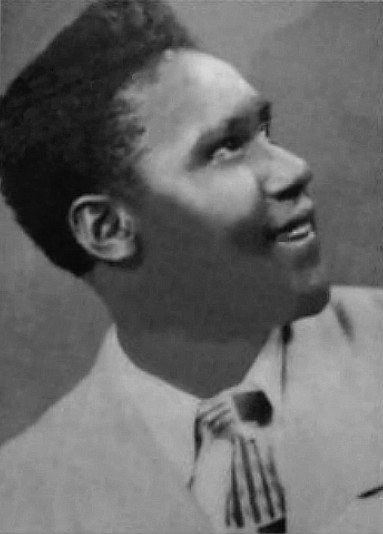
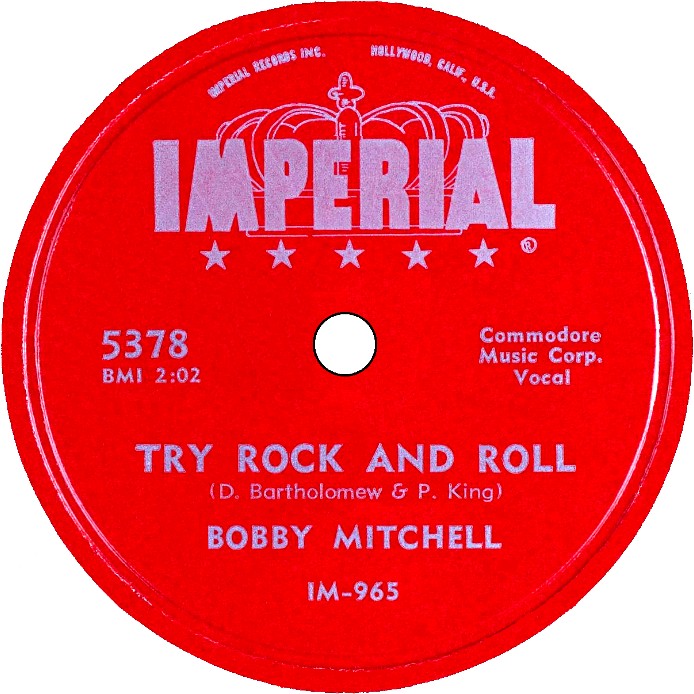
At Left: CASH BOX, March 31, 1956.
NOTE: The Spiders and The Barons will be included in Part Four of this article.Above Left: Bobby Mitchell.
Above Right: Label image for Imperial 5378, released in 1956. It's Bobby Mitchell's first record without The Toppers. He followed with two more single artist records on Imperial, the last of which was his big hit "I'm Gonna Be A Wheel Someday" in 1957.
Cash Box Review (2/11/56):
BOBBY MITCHELL — Imperial 5378
Try Rock And Roll (B+) Mitchell with a rock and roll piece of material. It is a middle beat blues well done by the chanter. Kids will like. It's good.
(NOTE: A rating of B+ was considered as "excellent".)LISTEN (Windows Media Player):
"Try Rock And Roll" - Bobby Mitchell - Imperial 5378 - 1956.
DAVE BARTHOLOMEW
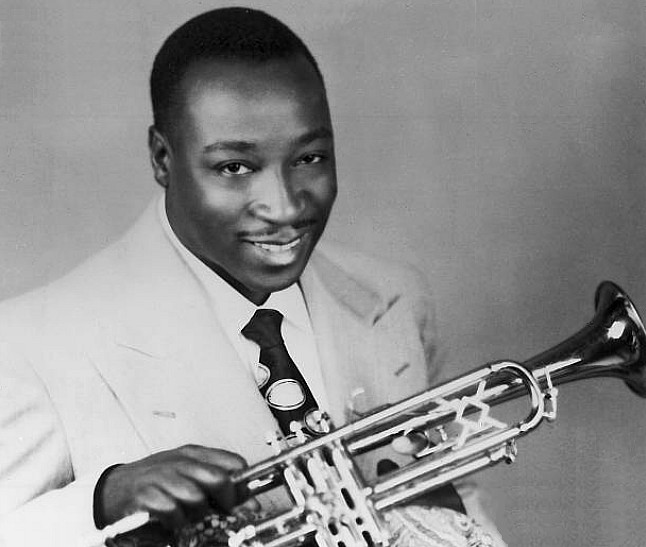
|
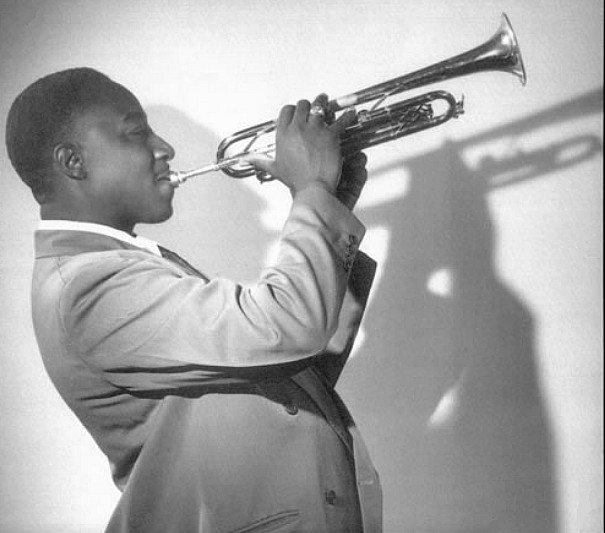
|
Above: Dave Bartholomew, from New Orleans, was a singer, trumpet player, orchestra leader, arranger, and songwriter. He joined Imperial Records in 1949 as an A&R man (artists and repertoire). It was his partnership with Fats Domino that brought and kept Imperial's huge success in the rhythm and blues field. While Dave's band backed up many artists on the Imperial label, he also had fifteen records on Imperial under his own name (1950-1958). Dave also had records on the DeLuxe (1949), Decca (1951), King (1951-1952), and Bayou (1953) labels.
Above Left: Label image for Imperial 5308, released in 1954. The flip-side, "Jump Children", composed by Fats Domino and Dave Bartholomew, is included in the next sub-section below. Above Middle: Label image for Bayou 005, released in 1953. The flip-side is "Country Gal", also composed by Dave Bartholomew. The same song had been done by him as "Country Boy" for Deluxe Records in 1949. That version includes a well done trumpet solo by Dave. Imperial released the same song as "Country Boy Goes To Town" by Dave Bartholomew in 1950.
Note that the label's layout and print style are the same as the Imperial label. Other artists on Bayou include Mercy Dee, Joe Houston, L. C. Williams, Goree Carter, Jesse Allen, Big Jay McNally, Joe Turner, and Fats Matthews. All of these had previously recorded for Imperial Records.
Above Right: CASH BOX, April 22, 1950.
Cash Box Review (10/2/54):
DAVE BARTHOLOMEW — Imperial 5308
Jump Children (C+) A quick beat jump item roughly vocaled by Dave Bartholomew against a rocking ork backing.
Cat Music (C+) Another hopper less frantic aimed at the cat crowd. Danceable tempo with an ok vocal by Bartholomew.
(NOTE: A rating of C+ was considered as "good".)Bayou Records was owned and operated by Franklin Kort, who previously had been sales manager for Exclusive Records (1940s), Swing Time (1950-52), and Recorded In Hollywood (1952-1953). Bayou's first release was in 1953, Red Callender's version of the then current instrumental hit, "The Honey Jump". After eighteen releases, Bayou folded in 1953.
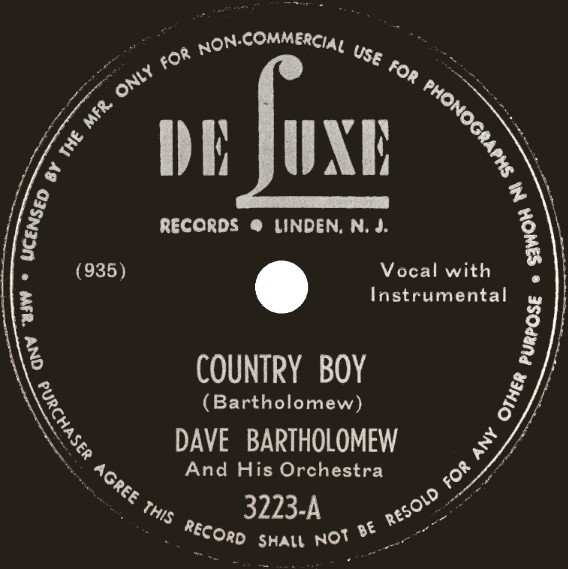
Bayou Records, located in Los Angeles, was affiliated with Imperial Records. The vast majority of artists released on Bayou had also recorded for Imperial. Bayou's record labels show the music publisher as "Commodore Music Corp.", which suggests that these were old masters that had been obtained from Imperial.
CASH BOX, April 18, 1953:
....Kort announced plans shortly after his resignation (from Recorded In Hollywood), for the formation of his own recording company. Widely known among record distributors throughout the nation, Kort enters the disc biz on his own with a varied selection of masters acquired through the years. Disclosure of the firm name and schedule for first releases are to be made shortly.CASH BOX, April 18, 1953:
....Franklin Kort, recently with Recorded in Hollywood Records, forms his own firm, Bayou Records .... and is also handling national distribution for Combo....
(NOTE: Wonder if the name "Bayou" was a tribute to Imperial Records' connection with New Orleans.)CASH BOX, May 9, 1953:
....Franklin Kort looking ten years younger these days as he bows into the biz with a label of his own, Bayou Records. Firm has set four releases for their initial offering to distribs, with two by Red Callender, a Mercy Dee, and a Joe Houston platter to start the ball rolling....CASH BOX, May 16, 1953:
....Franklin Kort's Bayou label off to a flying start....CASH BOX, June 20, 1953:
....Franklin Kort's Bayou label doing quite nicely, with a host of new disks scheduled for early release sure to make 'em sit up and take notice....CASH BOX, July 4, 1953:
....Franklin Kort's Bayou label has a winner in "Sabre Jet"....
(NOTE: "Sabre Jet" is by Joe Houston on Bayou 004.)LISTEN (Windows Media Player):
1. "Cat Music" - Dave Bartholomew - Imperial 5308 - 1954.
2. "Snatchin' Back" - Dave Bartholomew - Bayou 005 - 1953.
2. "Country Gal" - Dave Bartholomew - Bayou 005 - 1953.
4. "Country Boy" - Dave Bartholomew - DeLuxe 3223-A - 1949.ALL FOUR SONGS played in sequence.
(NOTE: "Jump Children" is included in the next sub-section below.)
FRANKLIN KORT — BAYOU RECORDS OWNER
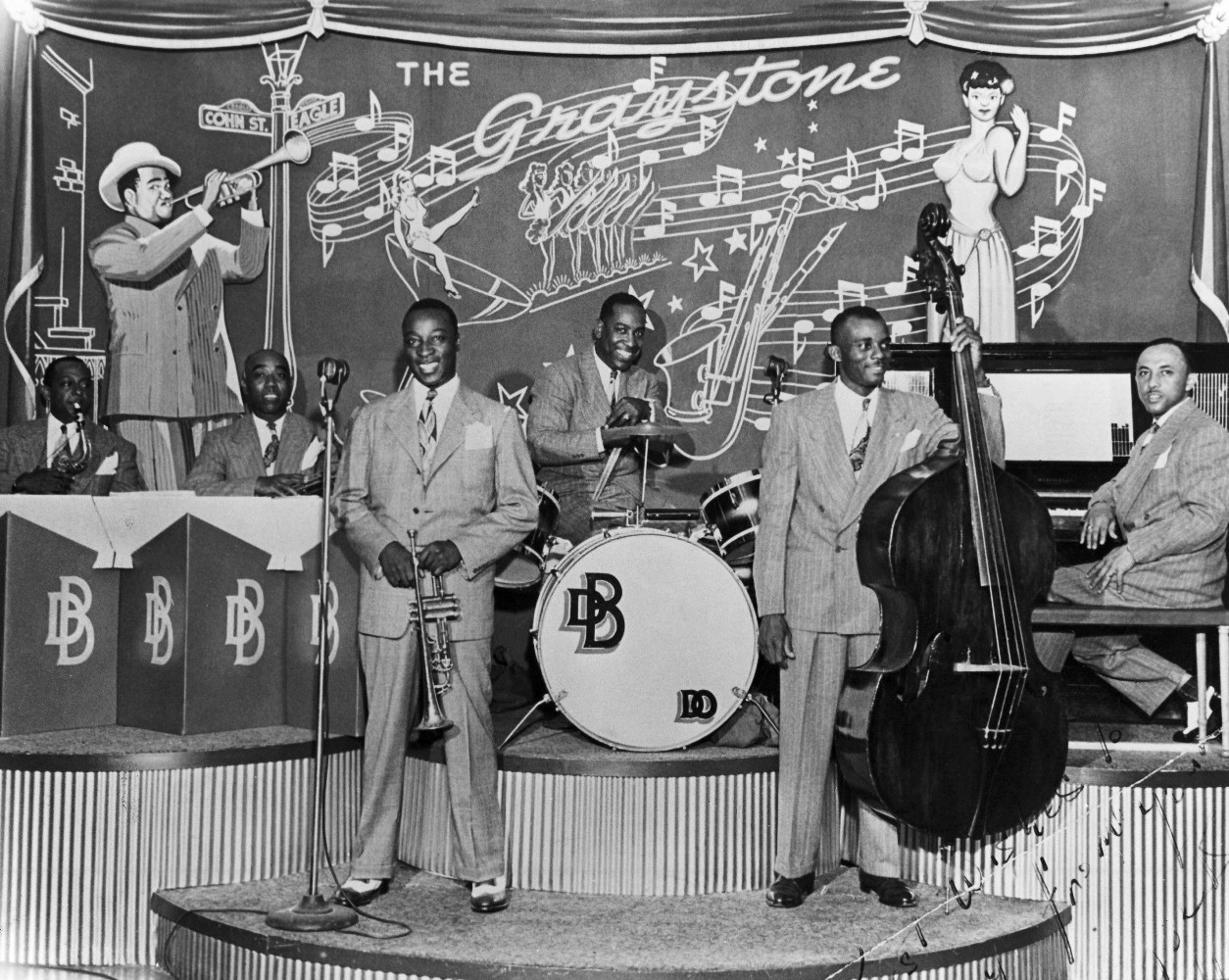
|
EXTRA RECORDS — "JUMP CHILDREN"
An early version of this song was done by Count Basie And His Orchestra and released in 1938 as "Do You Wanna Jump, Children?". The Composers credited on that record are "Donahue-Van Heusen-Bryant-Selsman". An instrumental record of the song was done by the Harlem Kiddies in 1944. Composers credited there are "Donahue & Bryan [no 't']".
The Bartholomew, Sweethearts, and Witherspoon versions of the song (see below) each have different verse lyrics, but the chorus is the same for all. For this reason, it seems reasonable that different people would take credit for writing the song. The Sweethearts' version, per ASCAP, was composed by Maurice King. At that time, King was musical director and tour manager for the Sweethearts. And, of course, per ASCAP, Modern Records' president Jules Bihari, as was his usual want, took credit for the Witherspoon version.
Above Left: Label image for Imperial 5308, released in 1954. Above Middle: Label image for Guild 141 A, released in October 1945. Vocal is by Tiny Davis, a trumper player in the orchestra. Guild was a New York City jazz label that existed from 1945 to 1946. The International Sweethearts Of Rhythm had two records on Guild, both of these in 1945.
Above Right: Label image for Modern 20-665A, released in 1949. Much more information about Jimmy Witherspoon can be found at Modern Records - Part Three.
The Billboard Review (12/8/45):
INTERNATIONAL SWEETHEARTS OF RHYTHM — Guild 141
Jump Children/Slightly Frantic
Altho a gal's band, there's plenty of guts in the blowing of these sepia lassies. Pack plenty of power in their blowing for the lively race blues, Jump Children, which Tiny Davis shouts out with a steady roll as the International Sweethearts rock the riffs.Gals also display plenty of drive, with an amazing amount of power in the brasses, for a solid instrumental, Slightly Frantic. Their first waxing, there's plenty of promise, with more commercial spinning material, in this aggregation of fems.
Enjoying a wide following in race circles, race locations should profit plenty from "Jump Children".
Cash Box Review (4/23/49):
JIMMY WITHERSPOON — Modern 20-665
Jump Children/Take Me Back Baby
Tainít much more need be said than just listen in to Jimmy Witherspoon, with the grand Buddy Floyd ork to background him, on two sides that have everything on the ball for a base cleaning home run. This is one hunk of wax thatíll jam any juke box with nickels, dimes and quarters.Itís got everything anyone can ask for from a disk. And Jimmy deserves a terrific hand for the grand job he does. Buy a boxful and spread íem around all your spots.
The Billboard Review (6/4/49):
JIMMY WITHERSPOON — Modern 20-665
Jump Children (84) Even a greater winner in potential lies in this formula blues. It resembles "Good Rocking Tonight" from the fine shout to the big booming beat.
(NOTE: Ratings had a range of 0-100 with 80-89 considered as "excellent".)LISTEN (Windows Media Player):
1. "Jump Children" - Dave Bartholomew - Imperial 5308 - 1954.
2. "Jump Children" - International Sweethearts Of Rhythm (Vocal By Tiny Davis) - Guild 141 A - 1945.
3. "Jump Children" - Jimmy Witherspoon - Modern 20-665A - 1949.ALL THREE SONGS played in sequence.
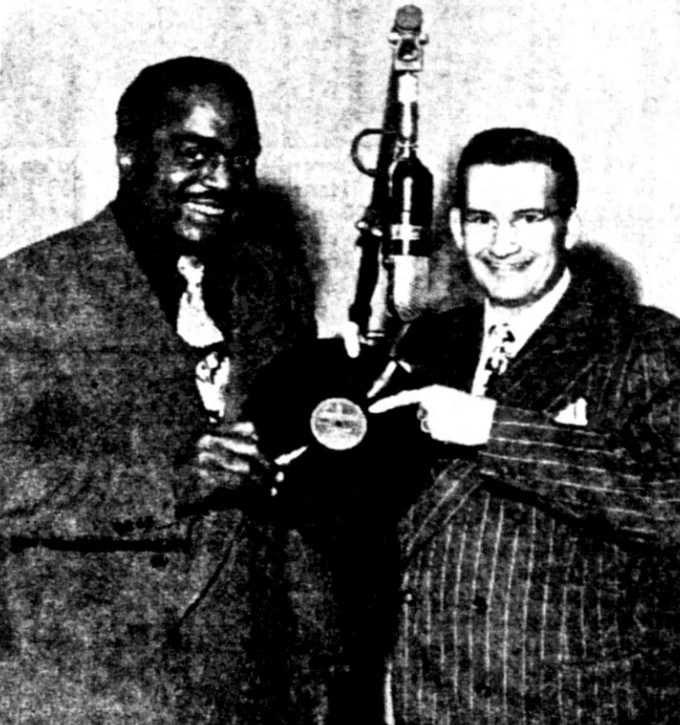
CALIFORNIA EAGLE — May 5, 1949 BLUES AT ITS BEST — Jimmy Witherspoon is shown here being congratulated by disc
jockey Hunter Hancock for his latest record hit "Ain't Nobody's Business".
(NOTE: The hit was on Supreme Records. It was re-issued on Swing-Time in 1951.
That record is included in the Modern Records - Part Three article.
Above Left: DURHAM MORNING HERALD (Durham, NC), February 24, 1946.
NOTE: A well done ad with a picture on one side and the event information on the other side.Above Right: Photo of Tiny Davis, trumpet player and singer. She was billed as "The Hottest Female Trumpeter In The Universe"!
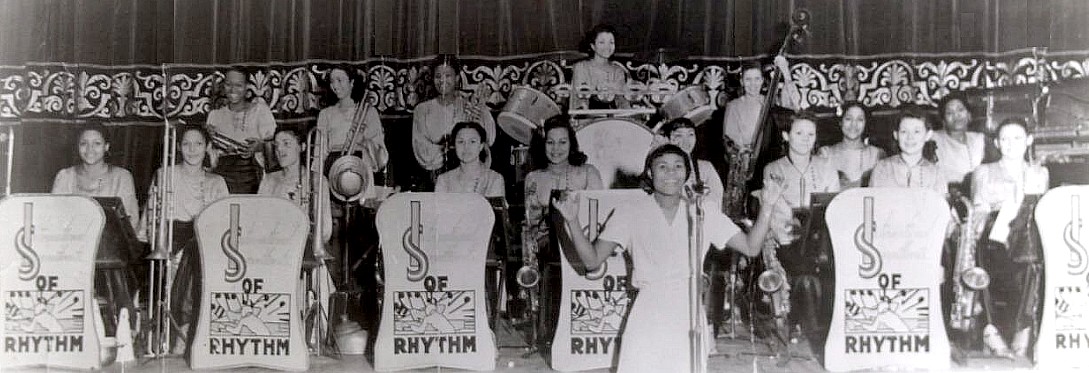
INTERNATIONAL SWEETHEARTS OF RHYTHM (It's hard to see, but their full name is on the logos.)
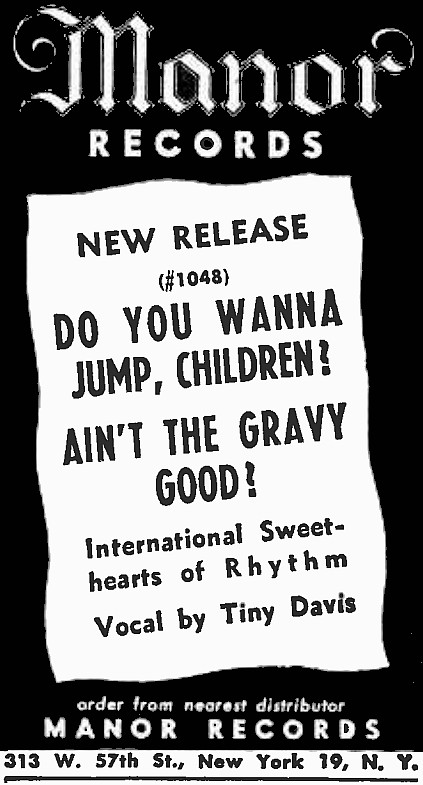
|
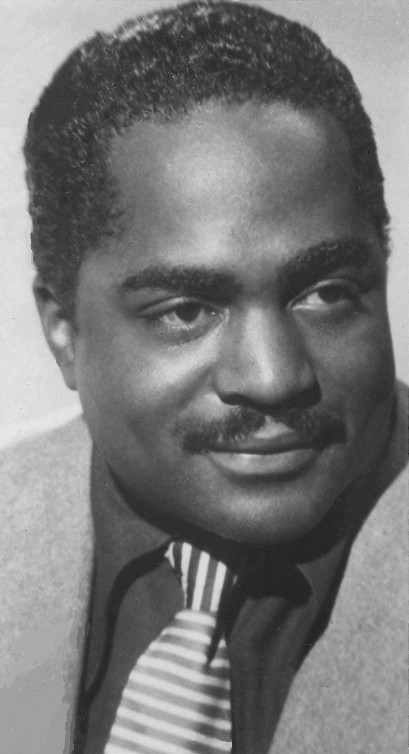
|
Above Left: THE BILLBOARD, December 28, 1946.
NOTE: The above referenced "Do You Wanna Jump, Children?" is the same song as "Jump Children" on Guild. Tiny Davis does the vocal. The International Sweethearts Of Rhythm had two records on the Manor label (1946-1947).Above Right: Photo of Jimmy Witherspoon.
(Photo is courtesy of Paul Ressler. Restoration is by Tony Fournier.)
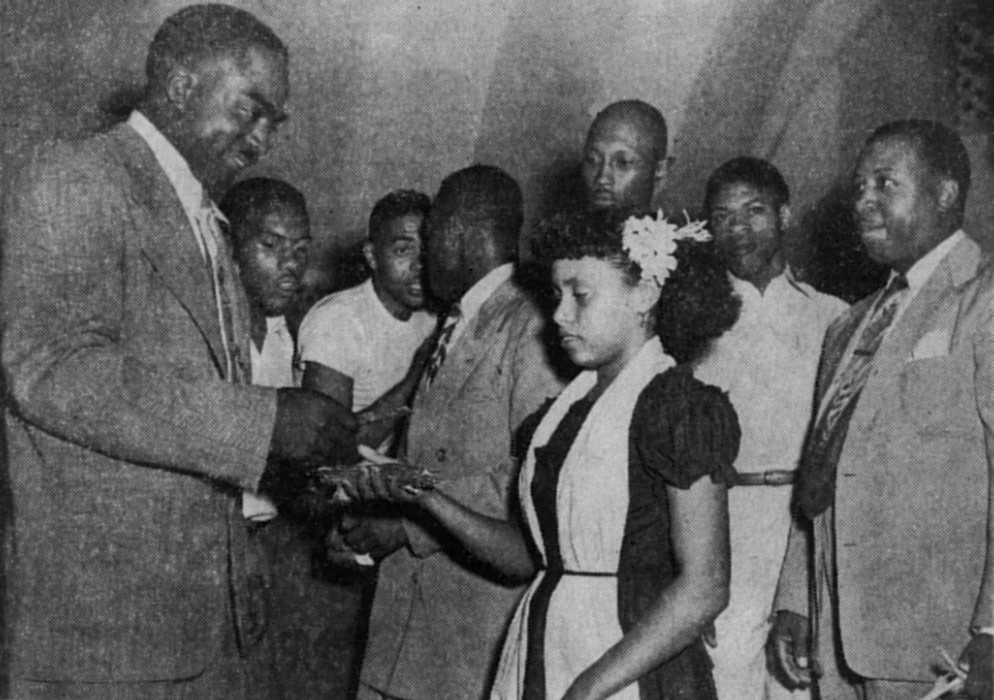
|
Above: ARIZONA SUN (Phoenix, AZ), August 19, 1949: OH! THEM GOLDEN SLIPPERS
Last week when Jimmy Witherspoon came to Riverside, we can sum it all up in these few words: A grand time was had by all. Especially little Miss Doris Smith, who had the right size foot which fit the Golden Slipper perfectly. She received the $25 award and was very much surprised as this was her first time winning any sort of contest....Witherspoon, not known to many Phoenicians, really made his name here, because his music was really jam up. Everyone was talking about the way Paul Madison (the tenor sax man) would floor show on those fine jump tunes. Everyone would stop dancing just to hear him blow while walking all over the dance floor. Words would never explain the act. You missed it if you didn't see it.
In the above picture you see Jimmy presenting the $25 to Miss Smith. Also, you see the judges starting from left to right, O. Maxwell, J. Wright, L. L. Westbrook, Johnny Bell, and Ben Wallace. Ben is the manager of the band.
(NOTE: No name given for the other "suit". "Paul Madison And Orch." recorded for Modern Records' subsidiary label, Colonial, in 1949.)
EXTRA RECORDS — DAVE BARTHOLOMEW
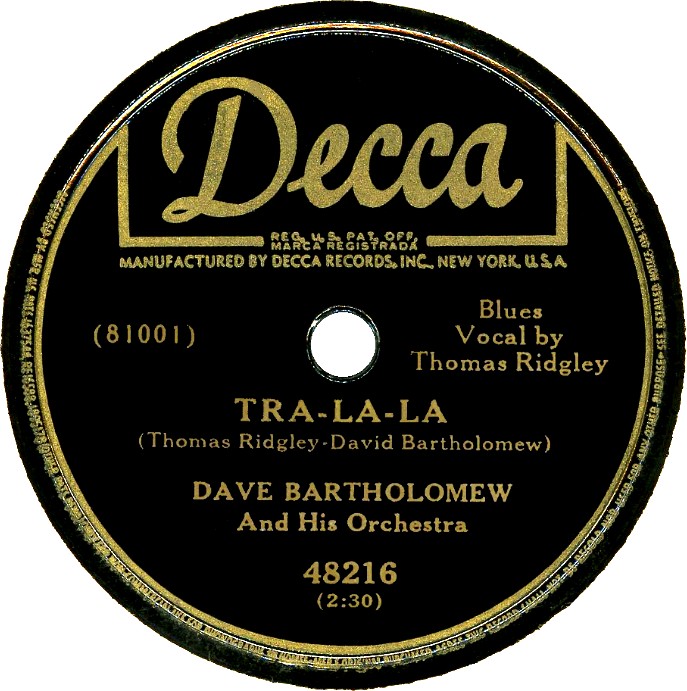
|
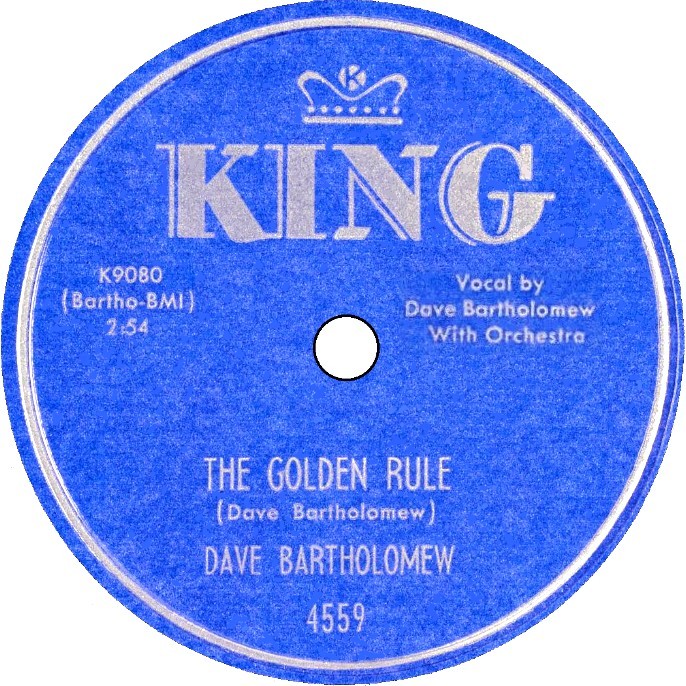
|
Above Left: Label image for Decca 48216, released in 1951. This is a different "Tra-La-La" than the 1956 LaVern Baker And The Gliders' song. Future Imperial Records' artist, Tommy Ridgley, is the vocalist. See if you notice any resemblence in the song to Fats Domino's "The Fat Man". The flip-side is "Teejim", an instrumental. Above Right: Label image for King 4559, released in 1952. Nice trumpet break by Dave Bartholomew here. The flip-side, also composed by Dave, is "Mother Knows Best".
Cash Box Review (9/13/52):
DAVE BARTHOLOMEW — King 4559
Mother Knows Best (C+) Dave Bartholomew sings a moderate blues in a potent manner. Musical backing is strong, resulting in an ok lid.
The Golden Rule (C+) Bartholomew dishes up a similar tempo bounce with zest.
(NOTE: A rating of C+ was considered as "good".)The Billboard Review (9/27/52):
DAVE BARTHOLOMEW ORK — King 4559
Mother Knows Best (74) The warbler hands this blues effort a good vocal as he tells how sorry he is that he did not listen to his mother.
The Golden Rule (72) Routine blues receives an effective reading from Bartholomew backed by a strong beat from the ork.
(NOTE: Ratings had a range of 0-100 with 70-79 considered as "good".)LISTEN (Windows Media Player):
1. "Tra-La-La" - Dave Bartholomew And His Orchestra (Vocal By Thomas Ridgley) - Decca 48216 - 1951.
2. "The Golden Rule" - Dave Bartholomew - King 4559 - 1952.
3. "Mother Knows Best" - Dave Bartholomew - King 4559 - 1952.ALL THREE SONGS played in sequence.
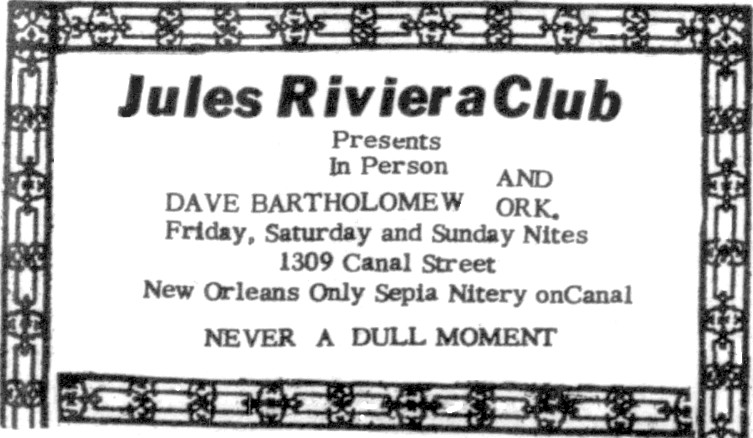
LOUISIANA WEEKLY — AUGUST 18, 1956
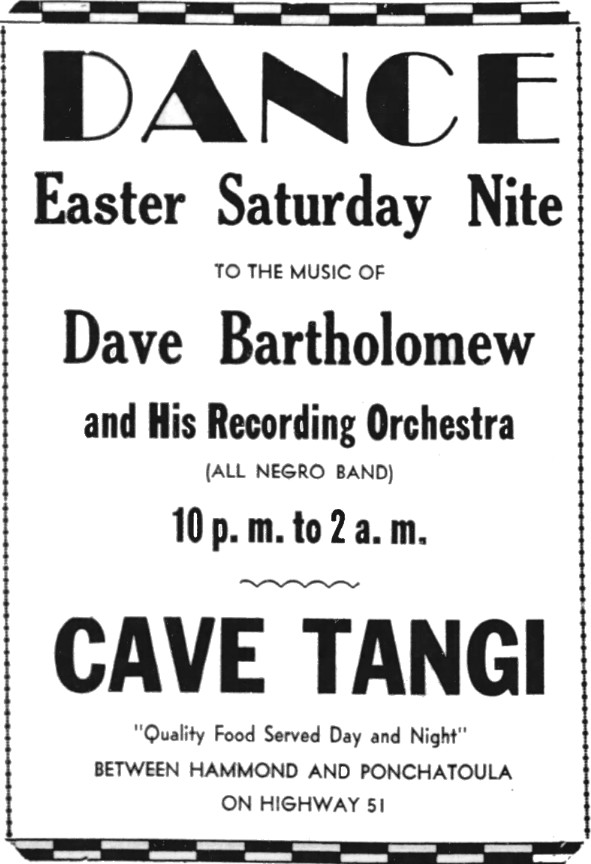
|
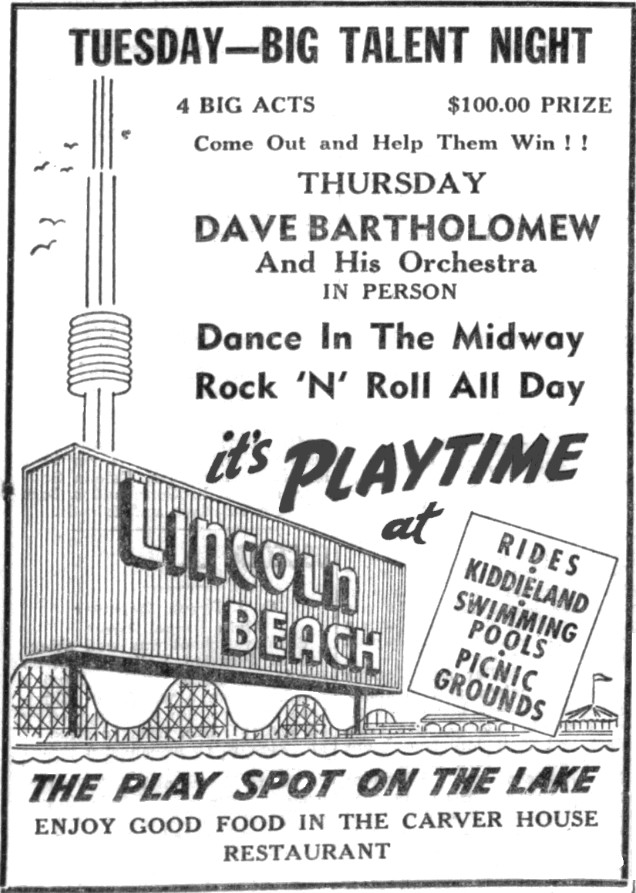
|
Above Left: HAMMOND VINDICATOR (Hammond, LA), March 23, 1951.
Above Right: LOUISIANA WEEKLY (New Orleans, LA), June 16, 1956.
THE LOVE NOTES
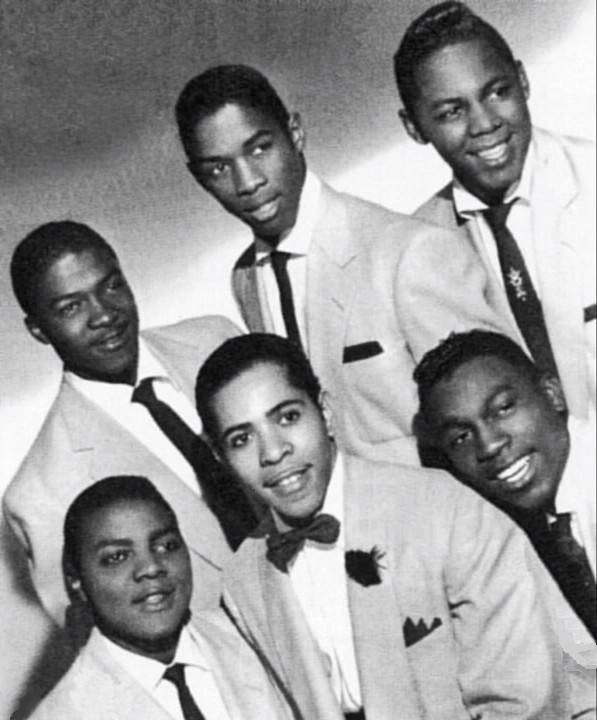
|
Above: Photo of The Love Notes, (Top L-R) Ed Anderson, Wallace Rose, Bob White, (Bottom L-R) John Davis, Larry Hinkson, and Teddy Santos. After this one record on Imperial, they had releases on Riviera and Rainbow, in 1954 for both labels.
Click HERE for an article about THE LOVE NOTES by Marv Goldberg. (Will open in a separate window)
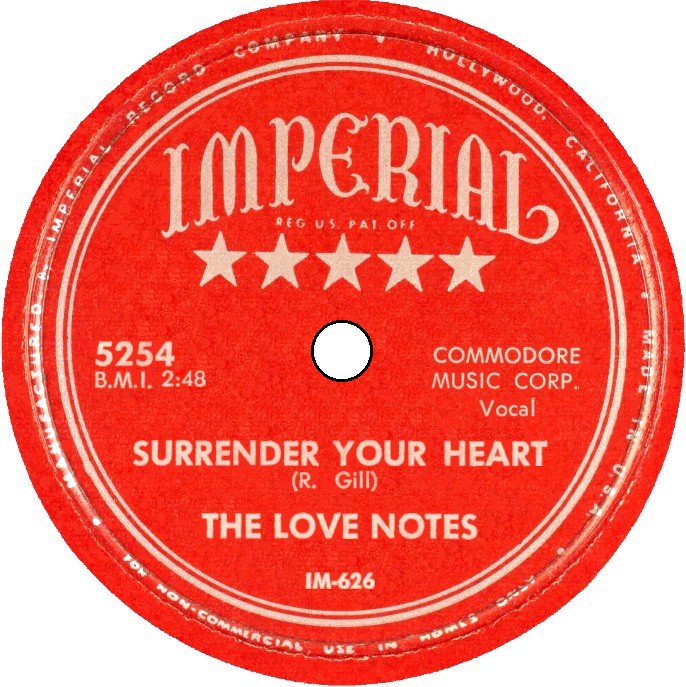
|
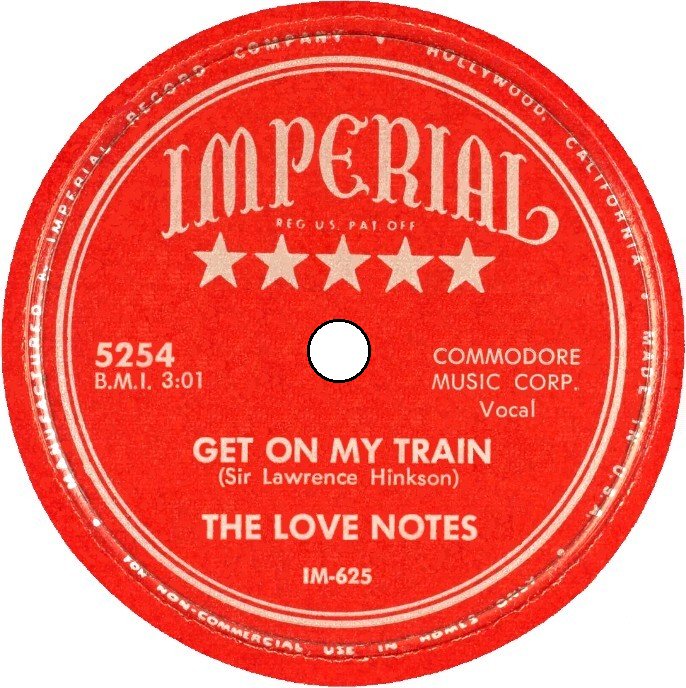
|
Above: Label images for both sides of Imperial 5254, released in 1953. Teddy Santos is lead singer on "Surrender Your Heart" and John Davis has the honor on "Get On My Train". Ronald Gill, a friend of The Love Notes, is the composer of "Surrender My Love". The flip-side was composed by Larry Hinkson, a member of the group. The Billboard Review (10/3/53):
THE LOVE NOTES — Imperial 5254
Get On My Train (73) This starts slowly and builds steadily. Beat is very heavy, at times muffling the group, but there are moments of excitement.
Surrender Your Heart (69) A very quiet side, with the lead doing most of the singing. Lead has the accented style that is so typical of many of today's groups.
(NOTE: Ratings had a range of 0-100 with 60-69 considered as "satisfactory" and 70-79 as "good".)Cash Box Review (10/10/53):
THE LOVE NOTES — Imperial 5254
Get On My Train (C+) The Love Notes wax a quick tempo bounce, complete with gimmick and wild go-go shouts, and come up with an exciting disk.
Surrender Your Heart (B) The under deck is a slow love ballad. Lead handles the melodic item softly and the group and ork keep the mood.
(NOTE: A rating of B was considered as "very good" and C+ as "good".)LISTEN (Windows Media Player):
1. "Surrender Your Heart" - The Love Notes - Imperial 5254 - 1953.
2. "Get On My Train" - The Love Notes - Imperial 5254 - 1953.BOTH SONGS played in sequence.
ROSE MITCHELL; JESSE ALLEN & AUDREY WALKER
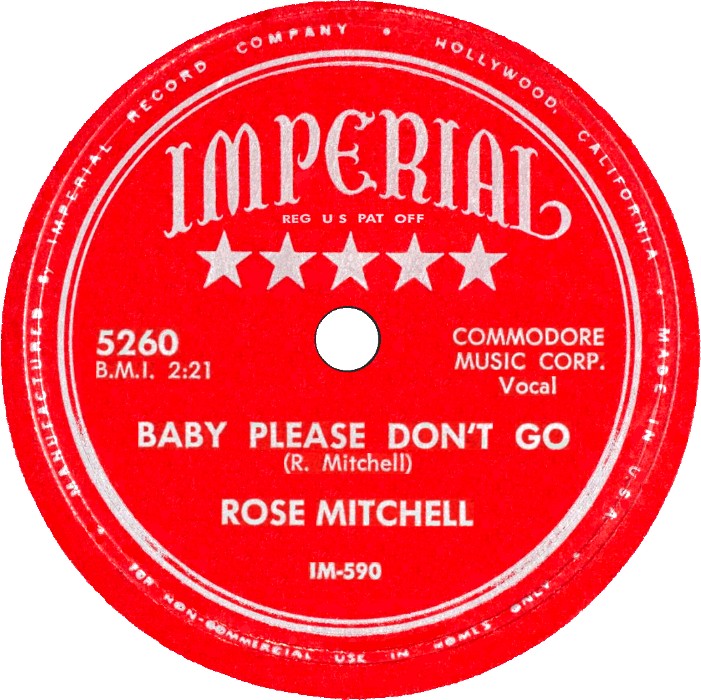
|
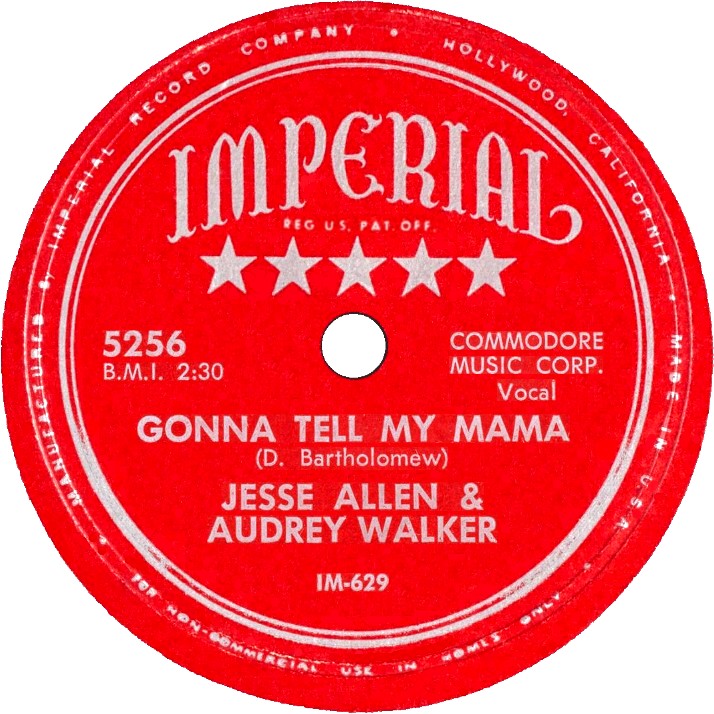
|
Above Left: Label image for Imperial 5260, released in 1953. The beginning of "Baby Please Don't Go" is a quite "different" style than by the usual blues singer. It's reminiscent of 1953's "Watermelon Man" by Browley Guy And The Skyscrapers on Checker. The flip is "Live My Life", composed by Dave Bartholomew. This is the second of two records that Rose Mitchell had on Imperial, both in 1953.
Above Right: Label image for Imperial 5256, released in 1953. The flip-side is "Gotta Call That Number", composed by Dave Bartholomew and Audrey Walker. This is her only record on the Imperial label and, as far as could be found, her only record. A blurb in the September 20, 1941 Billboard, in reference to a burlesque show, mentions "Audrey Walker, blues singer and stripper."
Jesse Allen had been with Aladdin in 1951 and Coral in 1952 before arriving at Imperial Records. There he had four records released in 1953-1954. Also in 1953, he had one record on the Bayou label, probably from masters obtained from Imperial.
THE BILLBOARD, July 11, 1953: TV THEMES STIR INDIE DISKINGS
....attorneys for the TV program "Dragnet" forced Lew Chudd's [sic] Bayou label to withdraw from circulation the Jesse Allen satirical waxing of the shows theme. The attorneys, Pacht, Tannenbaum and Ross, also said they are checking Modern Records' "Dragnet Blues"....At Right: 1953 Poster referencing Jesse Allen's "Dragnet Blues". The New Era Club was located in Modesto, CA.
The Billboard Review (10/10/53):
JESSE ALLEN-AUDREY WALKER — Imperial 5260
Gonna Tell My Mama (67) The boy-girl team sounds good here, but the material is just a bit too ordinary.
Gotta Call That Number (65) Again the material is only fair. Moreover, the gal is far less effective on this side.
(NOTE: Ratings had a range of 0-100 with 60-69 considered as "satisfactory".)LISTEN (Windows Media Player):
1. "Baby Please Don't Go" - Rose Mitchell - Imperial 5260 - 1953.
2. "Live My Life" - Rose Mitchell - Imperial 5260 - 1953.
3. "Gonna Tell My Mama" - Jesse Allen And Audrey Walker - Imperial 5256 - 1953.
4. "Gotta Call That Number" - Jesse Allen And Audrey Walker - Imperial 5256 - 1953.ALL FOUR SONGS played in sequence.
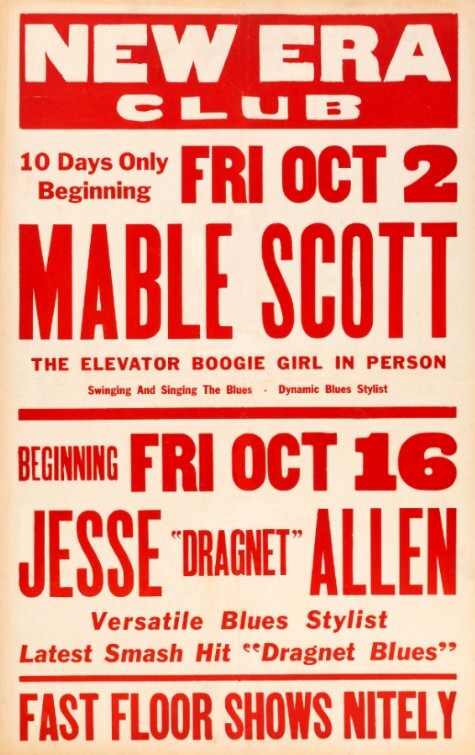
EXTRA RECORD — JESSE ALLEN
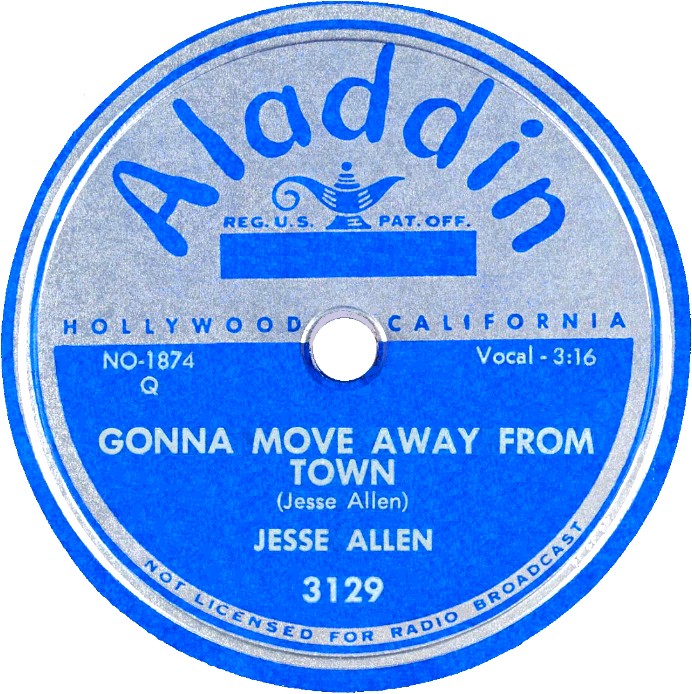
|
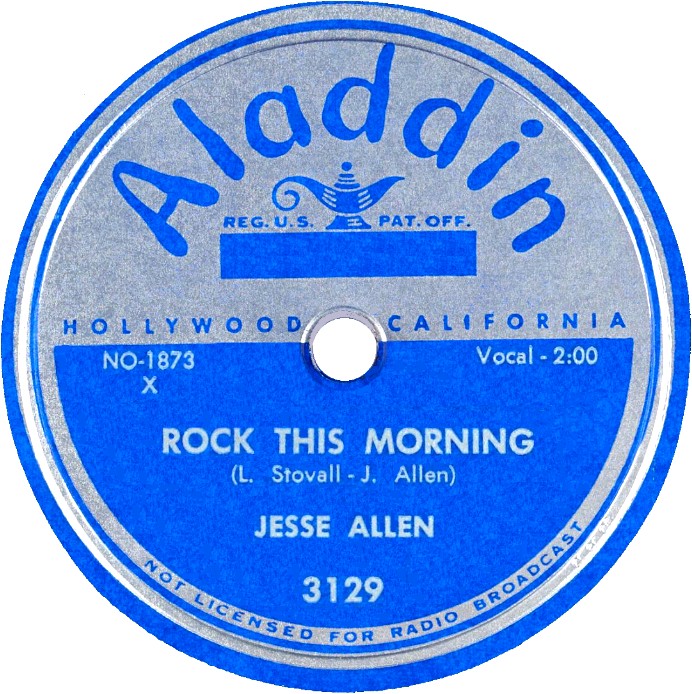
|
Above: Label images for both sides of Aladdin 3129, released in 1952. BMI credits Levy Stoyall [not Stovall] and James A Jessie [not Jesse] as the composers of "Rock This Morning". The BMI "Jessie" name is likely either Jesse Allen's real name or his assumed name for composer purposes. Cash Box Review (4/26/52):
JESSE ALLEN — Aladdin 3129
Gonna Move Away From Town/Rock This Morning
A slow dynamic blues is given a dramatic reading by Jesse Allen. Allen, who wrote the tune, sings the sad lyrics potently. The musical group sets up the vocalist smoothly, as they back him in polished manner.Flip is a fast boogie beat that Allen belts out with zest. Allen's vocal and the supporting instrumentalists combine to make this a top flight waxing.
LISTEN (Windows Media Player):
1. "Gonna Move Away From Town" - Jesse Allen - Aladdin 3129 - 1952.
2. "Rock This Morning" - Jesse Allen - Aladdin 3129 - 1952.BOTH SONGS played in sequence.
GUITAR SLIM
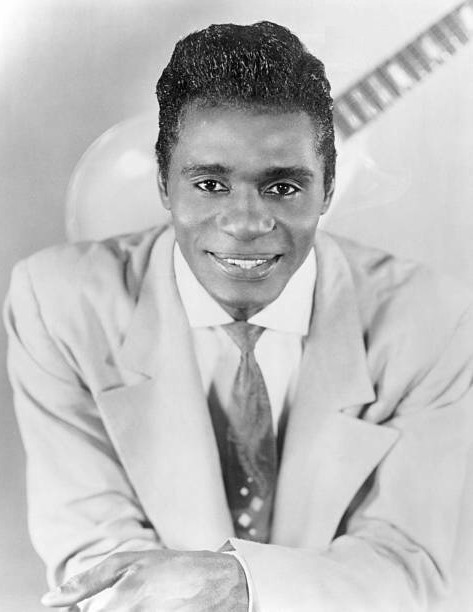
|
Above: Guitar Slim (real name Eddie Jones), born in Mississippi, was a New Orleans singer, guitarist, composer, and band leader. He was billed as the "New Mr. Blues". Slim recorded for the Imperial, J-B/Bullet, Specialty, and Atco labels. On Imperial, Slim had two records in 1951 and two in 1954. The 1954's are reissues of the four 1951 sides, possibly due to Slim's success on the Specialty label about that time. His "The Things That I Used To Do" on Specialty, composed by him, was a number one rhythm and blues hit.
Above Left/Right: Label images for both sides of Imperial 5310, recorded in May 1951 and re-issued in 1954. Composers of both sides are "Eddie Jones" (aka Guitar Slim) and "Al Young", who was one of the A&R men at Imperial Records. Above Middle: Guitar Slim hard at work.
The Billboard Review (10/9/54):
GUITAR SLIM AND HIS PLAYBOYS — Imperial 5310
Standin' At The Station (77) The Southern blues chanting style stands out as usual on this Guitar Slim reading. The guy's many fans will want this. Good wax here.
New Arrival (74) This is standard blues on which Slim's guitar solos take top honors.
(NOTE: Ratings had a range of 0-100 with 70-79 considered as "good".)Cash Box Review (10/16/54):
GUITAR SLIM AND HIS PLAYBOYS — Imperial 5310
New Arrival (B) Guitar Slim likes his pocket full of money and his whiskey, gin, and wine. Ditty is a middle tempo bounce displaying Guitar Slim's plucking and vocal abilities in large portions. Spirited wax with lots of appeal.
Standin' At The Station (B+) Slim sings the blues on this slow beat platter. Slim said goodbye to his baby and hung his head and cried. Slim sings with feeling as he portrays the woebegone and disillusioned male.
(NOTE: A rating of B was considered as "very good" and B+ as "excellent".)LISTEN (Windows Media Player):
1. "New Arrival" - Guitar Slim & His Playboys - Imperial 5310 - 1954.
2. "Standin' At The Station" - Guitar Slim & His Playboys - Imperial 5310 - 1954.BOTH SONGS played in sequence.
EXTRA RECORD — GUITAR SLIM
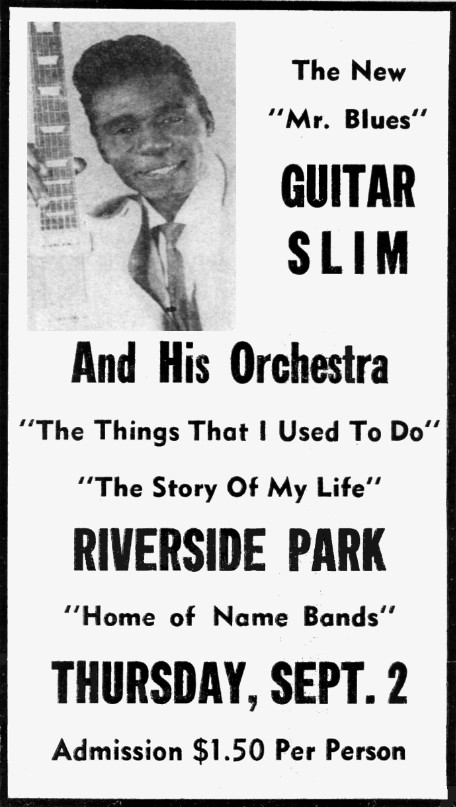
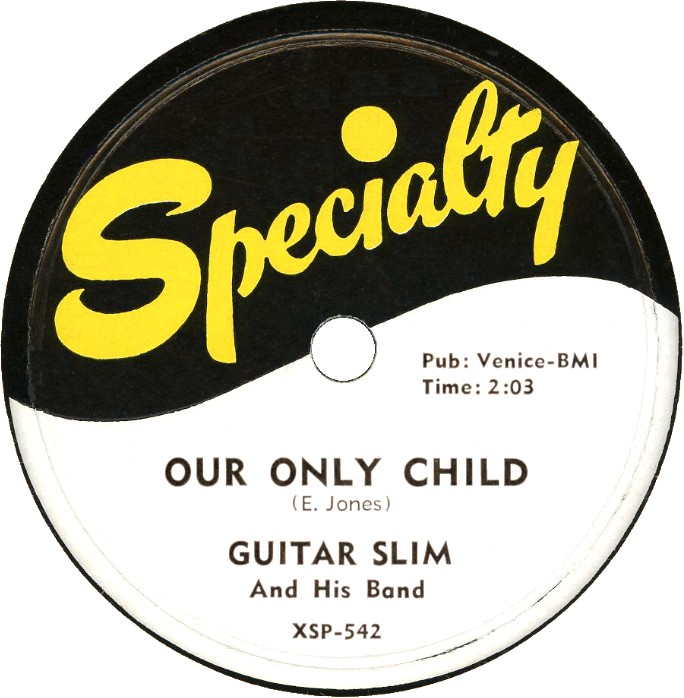
At Left: ARIZONA SUN (Phoenix, AZ), August 27, 1954.
Above: Label image for Specialty XSP-542, recorded on September 28, 1954 and released in January 1955. The song was composed by Eddie Jones aka Guitar Slim.
The Billboard Review (1/29/55):
GUITAR SLIM — Specialty 542
Our Only Child (78) Slim turns in a sock performance here of an intriguing piece of material in which he lectures his wife about running around and leaving their only child alone. Item is off the beaten path, but the chanter's performance and guitar work could help it go. Watch it.
(NOTE: Ratings had a range of 0-100 with 70-79 considered as "good".)LISTEN (Windows Media Player):
"Our Only Child" - Guitar Slim And His Band - Specialty XSP-542 - 1955.
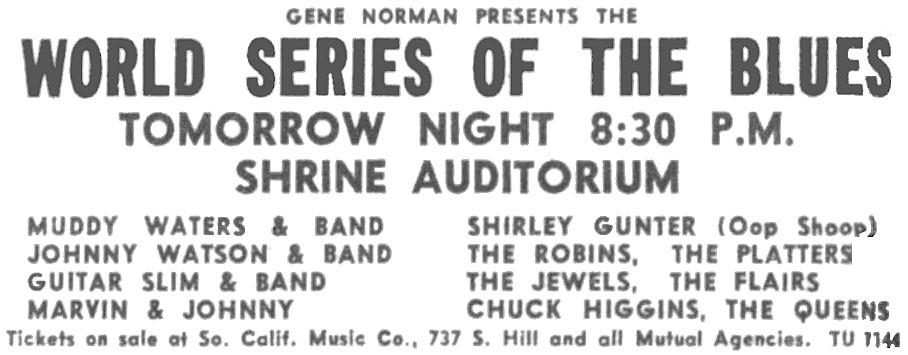
|
Above: DAILY NEWS (Los Angeles, CA), September 24, 1954.
NOTE: Gene Norman was a disk jockey at KLAC, located in Hollywood, CA, at the time. He also was proprietor and president of the GNP (Gene Norman Presents) record label, also in Hollywood. It must be said, Gene certainly knew how to program a great r&b stage show! With the above line-up, no need to include the price of a ticket!
IMPERIAL RECORDS - PART ONE FEATURES LALO GUERRERO, DICK LEWIS AND HIS HARLEM RHYTHM BOYS, "POISON" GARDNER, "FAT MAN" HAMILTON, CHARLIE "BOOGIE WOOGIE" DAVIS, KING (JAKE) PORTER, DOROTHY ELLIS, STASH CARTER, JOE TURNER, ARCHIBALD, AND FATS DOMINO. IMPERIAL RECORDS - PART TWO FEATURES FATS DOMINO, CECIL GANT, LIL' SON JACKSON, T-BONE WALKER, SMILEY LEWIS, MARY WALLACE, BIG JAY McNEELEY, JOE HOUSTON, AND TOMMY RIDGLEY.
IMPERIAL RECORDS - PART FOUR FEATURES FATS DOMINO, GENE GILMORE, LITTLE BOOKER, PEE WEE CRAYTON, THE SPIDERS, THE HAWKS, THE PELICANS, AND THE KIDDS.
IMPERIAL RECORDS - PART FIVE FEATURES THE JEWELS, ROOSEVELT SYKES, THE BARONS, THE HONEY BEES, THE GAY NOTES, ROY BROWN, AND RICKY NELSON. ALSO, AFFILIATED LABELS AND IMPERIAL'S GOSPEL. HIGHLIGHTED SONGS ARE "LET THE FOUR WINDS BLOW" AND "GOOD ROCKING TONIGHT".
Listen to all of this article's R&B audio selections using Windows Media Player:
|
1. "Chew Tobacco Rag" - Billy Briggs - Imperial 8104 - 1951.
2. "Rose-Marie" - Slim Whitman - Imperial 8236 - 1954. 3. "Indian Love Call" - Slim Whitman - Imperial 8156 - 1952. 4. "China Doll" - Slim Whitman - Imperial 8156 - 1952. 5. "All That I'm Asking Is Sympathy" - Slim Whitman - Imperial 8180 - 1953. 6. "Dear Mary" - Slim Whitman - Imperial 8307 - 1956. 7. "The Whiffenpoof Song" - Slim Whitman - Imperial 8307 - 1956. 8. "It's Music" - Smiley Lewis - Imperial 5252 - 1953. 9. "Blue Monday" - Smiley Lewis - Imperial 5268 - 1954. 10. "Down The Road" - Smiley Lewis - Imperial 5268 - 1954. 11. "That Certain Door" - Smiley Lewis - Imperial 5296 - 1954. 12. "I Hear You Knocking" - Smiley Lewis - Imperial 5356 - 1955. 13. "One Night" - Smiley Lewis - Imperial 5380 - 1956. 14. "Please Listen To Me" - Smiley Lewis - Imperial 5389 - 1956. 15. "She's Got Me Hook, Line & Sinker" - Smiley Lewis - Imperial 5389 - 1956. 16. "Blue Monday" - Fats Domino - Imperial 5417 - 1956. 17. "I'm Crying" - Bobby Mitchell & The Toppers - Imperial 5236 - 1953. 18. "Rack 'Em Back" - Bobby Mitchell & The Toppers - Imperial 5236 - 1953. 19. "One Friday Morning" - Bobby Mitchell & The Toppers - Imperial 5250 - 1953. 20. "4 - 11 = 44" - Bobby Mitchell & The Toppers - Imperial 5250 - 1953. 21. "Meant For Me" - Bobby Mitchell & The Toppers - Imperial 5295 - 1954. 22. "The Wedding Bells Are Ringing" - Bobby Mitchell & The Toppers - Imperial 5295 - 1954. 23. "She Couldn't Be Found" - Bobby Mitchell And The Toppers - Imperial 5309 - 1954. 24. "I'm A Young Man" - Bobby Mitchell And The Toppers - Imperial 5309 - 1954. 25. "Try Rock And Roll" - Bobby Mitchell - Imperial 5378 - 1956. 26. "Cat Music" - Dave Bartholomew - Imperial 5308 - 1954. 27. "Snatchin' Back" - Dave Bartholomew - Bayou 005 - 1953. 28. "Country Gal" - Dave Bartholomew - Bayou 005 - 1953. 29. "Country Boy" - Dave Bartholomew - DeLuxe 3223-A - 1949. 30. "Jump Children" - Dave Bartholomew - Imperial 5308 - 1954. 31. "Jump Children" - International Sweethearts Of Rhythm (Vocal By Tiny Davis) - Guild 141 A - 1945. 32. "Jump Children" - Jimmy Witherspoon - Modern 20-665A - 1949. 33. "Tra-La-La" - Dave Bartholomew And His Orchestra (Vocal By Thomas Ridgley) - Decca 48216 - 1951. 34. "The Golden Rule" - Dave Bartholomew - King 4559 - 1952. 35. "Mother Knows Best" - Dave Bartholomew - King 4559 - 1952. 36. "Surrender Your Heart" - The Love Notes - Imperial 5254 - 1953. 37. "Get On My Train" - The Love Notes - Imperial 5254 - 1953. 38. "Baby Please Don't Go" - Rose Mitchell - Imperial 5260 - 1953. 39. "Live My Life" - Rose Mitchell - Imperial 5260 - 1953. 40. "Gonna Tell My Mama" - Jesse Allen And Audrey Walker - Imperial 5256 - 1953. 41. "Gotta Call That Number" - Jesse Allen And Audrey Walker - Imperial 5256 - 1953. 42. "Gonna Move Away From Town" - Jesse Allen - Aladdin 3129 - 1952. 43. "Rock This Morning" - Jesse Allen - Aladdin 3129 - 1952. 44. "New Arrival" - Guitar Slim & His Playboys - Imperial 5310 - 1954. 45. "Standin' At The Station" - Guitar Slim & His Playboys - Imperial 5310 - 1954. 46. "Our Only Child" - Guitar Slim And His Band - Specialty XSP-542 - 1955. ALL FORTY-SIX ABOVE SONGS played in sequence. ALL THIRTY-FIVE ABOVE IMPERIAL LABEL SONGS played in sequence.
|
Last Update: May 8, 2023
E-mail Me: